#obviously all the dialogue is in English up until the reveal
Explore tagged Tumblr posts
Text
Fuck it you know what, here's my 5 minute/elevator pitch for something on this theme:
We open in a small isolated town somewhere in the continental US during a thunderstorm and get introduced to the main characters. A few days later, whilst everyone's going about their business, a seriously wounded person staggers into town and gets recognised as someone who's recently moved to the next town over. After getting seen to by the local doctor, they tell a horrifying story about how during the storm their town got attacked by some huge supernatural creature which couldn't be stopped and seemed to teleport around the place, killing the townsfolk indiscriminately, using the thunder and lightning as weapons. Obviously, the townsfolk dismiss their claims, but given the survivor's agitation and wounds the mayor/sheriff authorities a posse to investigate, thinking that they've maybe encountered some bears/cougars/wolves and are panicked because they're unfamiliar with the local wildlife.
However, when the posse reaches the next town, they find the place in ruins, with mutilated bodies piled everywhere, buildings burnt and no signs of anything that could have possibly caused the damage. They also find a young child who's been hiding somewhere and who's account seems to corroborate the first survivor's claims.
The posse then sends back to town for more people and they make efforts to clean up the town/dispose of the bodies. However, after the clean up happens and everybody heads home, the townsfolk start to develop some kind of strange sickness that the doctor can't treat (it's nothing like anything they've encountered before and their attempts at treatment don't do anything to help). As the sickness spreads, and more and more people report seeing/hearing the creature in the woods on the outskirts of town and losing their animals to it (there's thunder and flashes like lightning but no other signs of a storm), the townsfolk start to turn on one another, suspecting that the sickness is somehow connected to the creature and the destruction of the neighbouring town and the posse have somehow brought it back with them. The mayor/sheriff reluctantly organises a militia to help keep order in the streets and establish a protective cordon around the town to both protect against the creature and control the spread of the sickness.
After a clear/confirmed sighting of the creature, the militia decides to pursue it into the woods, wounding and then eventually killing it. As the militia patrol gathers round the body and examines it, they find the creature to be a European man dressed in armour, armed with sword, pike and a matchlock musket. The camera then pans back up to the militia, revealing them to actually be Amerindian warriors armed with bows and clubs and discussing what to do in a native language. The camera pans out as they drag the body back to their pallisaded village of wooden huts to reveal a group of European soldiers breaking camp and beginning to march in the direction of the village.
There’s got to be some time periods ripe for horror movies which we just don’t do.
Yeah, yeah, Victorian gothic horror seen it, what about the aftermath of the Great Fire of Rome? What about what “really” happened at Skara Brae? A horror film during the First Crusade? The French Revolution? This is too European focused but you get my drift??
(If people know films like this, hit me up. I love horror and history)
#obviously all the dialogue is in English up until the reveal#and there shouldn't be subtitles other than in the native language#and there should be no suggestion its not a modern setting either#I reckon there's plenty of scope for horror based around European contact from the perspective of indigenous people#horror#history#history nerdery#indegenous#history nerd#writing stuff#creative writing#writers of tumblr#movie pitch#twist ending
605 notes
·
View notes
Text
ENA:DBBQ Speculation Megapost
OBVIOUSLY SPOILERS AHEAD Hyperfixation waxes and wanes over the ocean of interpretive works, and I once again find myself on the shores of a new captivation. Now, I'm not the type to listen to other's interpretations of things before forming my own thoughts. Perhaps this will be retreading old ground, perhaps there will be fresh takes. I just want to commit my thoughts to writing before I slide down the slippery slope of feature-length lore videos and whatnot.
So, where to begin on the subject of ENA: Dream BBQ Chapter 1? I think a good starting point would be...
1: The Title Character Herselves, ENA

Right from the very first trailer, we could all tell: This ENA is different from the one we know from the webseries. Some say that this is a different ENA from before. Others suggest that perhaps something changed her. Maybe it's something in between. For the purposes of this post, I will be referring to this ENA as being her own individual, with no connection to the previous ENA until proven otherwise. The ENA of Dream BBQ will be simply be referred to as ENA. The ENA of the webseries will be referred to as "Ur-ENA"
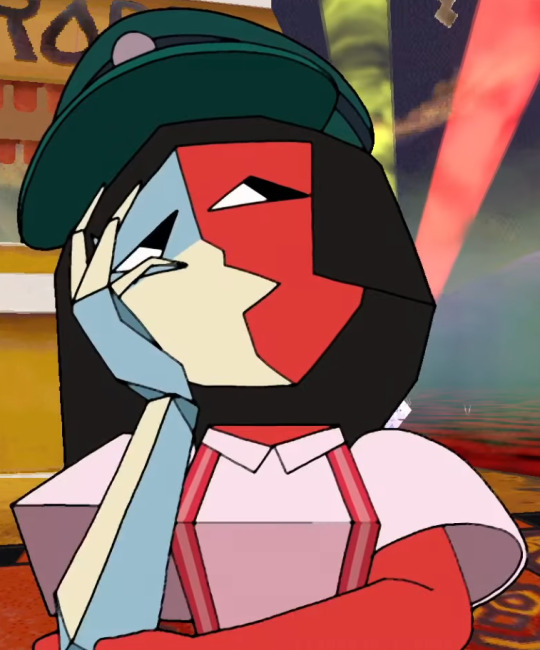
So, we have a salesperson with a bit of a short temper. But as we experience the world through her eyes, there are some questions that come to mind. The first of which is, "What is her job anyway?" Well, right off the bat, there's some troubling implications. She appears to be after a "Boss", who has gone into hiding, and whom ENA and Froggy refer to as their "Target". The obvious interpretation is that ENA is a contract killer of some sort. But... there is room for doubt.

It was Froggy who first refers to The Boss as a "Work Target", very specifically using English words, that "wacky language" as he calls it. He may have coined this phrase without necessarily knowing the connotations of referring to a person as a "Target". This is brought up by Theodora the Genie, who asks ENA, "Do you even know the ingredients of that word salad?"
But, for reasons we'll get into later, it wouldn't be particularly surprising to anyone if ENA was hired to kill someone. Not after the incident.
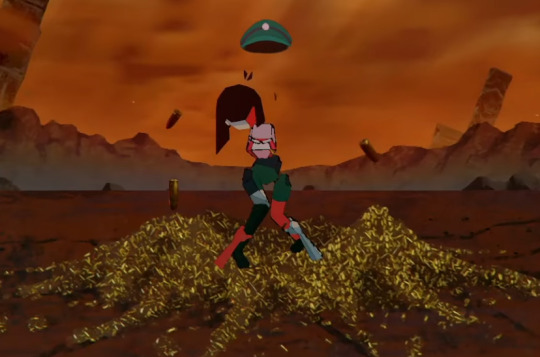
CHEESE AND RICE, ENA
As you talk to more and more people in the game, it becomes clear that this ENA is universally despised. Even a lot of the more agreeable characters tend to have some hint of resentment in their words when speaking to her.
This brings us to what appears to be the underlying theme of Dream BBQ: Sin and Forgiveness. ENA has evidentially committed some unspeakable act in the past, some great Sin that has made her known throughout all the worlds. As to the severity of this Sin? We get a hint when ENA first lays eyes on the Bathroom, a place that has been referred to as somewhere where Sins are absolved and Truth is revealed (seriously, two of the stalls have a damn confessional window between them).
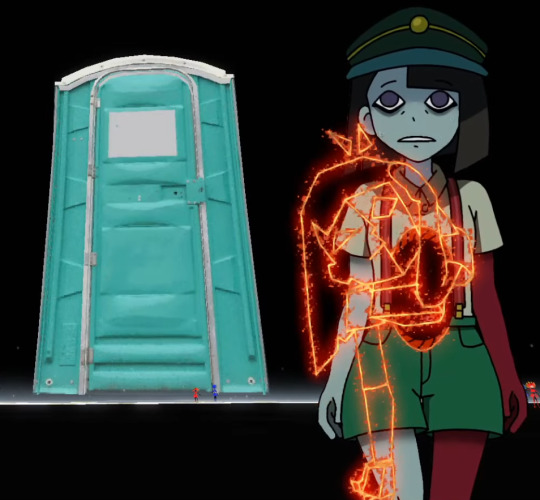
"A giant bathroom? Uggh... It's not enough for this many bodies. I hate myself."
This seems to be heavily implying that ENA was apparently responsible for a horrific massacre that occurred in the past. An act beyond any hope of redemption, hammered home by the conversation with Theodora if you actually make it to the Bathroom.
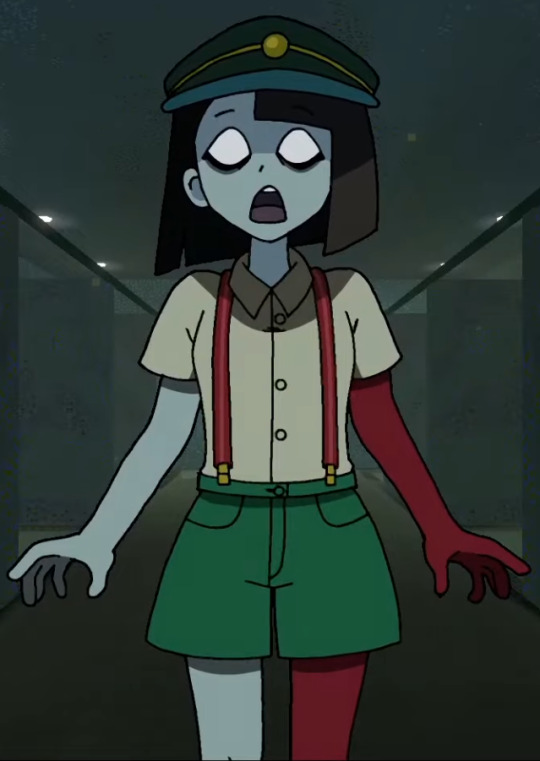
When first speaking to Theodora, she mistakenly forgives ENA's Sins briefly, which immediately mends the gaping wound in her body. Whatever is going on with Human(?) ENA, it seems clear that the wound is representative of guilt rather than a literal physical injury. Ultimately, Theodora offers to fulfill one of ENA's Asperations, and you're presented with the only dialogue options offered in the current version of the game. You're given a list of choices, but you quickly learn that desires are never fulfilled, nor quenched. Any option that would immediately bring ENA peace is doomed to fail for one reason or another.
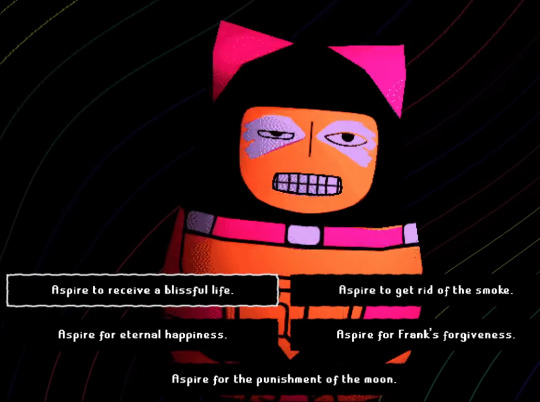
Like the rest of them... Like the rest of them... A blissful life? No, that aspiration is beyond what ENA is capable of herself, and cannot be granted.
Eternal happiness? No, the natural order of things cannot be changed.
Frank's forgiveness? Refuted outright, in a way that implicitly says "You know perfectly well why you cannot have that." Punishing the Moon? No, the only one that deserves to be punished for being born is ENA herself. All that ENA can aspire to is to perform the task that she has been given. Nothing more. You leave with more questions than you entered with.
Despite all this, ENA carries on with an unwavering faith in G0D and destiny. Several of her interactions bring up matters of faith in a way that seems to... agitate people. Perhaps they see her penitent ways as a means to evade the consequences of her past actions. Perhaps they may even be right. Regardless, ENA seems to find comfort in the idea of an inevitable fate outside of her control.

(And now for the super speculative part that has me going off of 'vibes' more than anything concrete.) As for her Sin, well, my personal interpretation is that the Incident occurred due to ENA being negligent rather than malicious. I could be way off, but the intense weight of her guilt feels like it comes from a 'personal failure', a mindset reflected in her extremely adamant work ethic.
When attending the Purge Event, even though it's for the sake of reaching the Bathroom, she seems completely devastated by the thought that she is on some level slacking off while on the job.
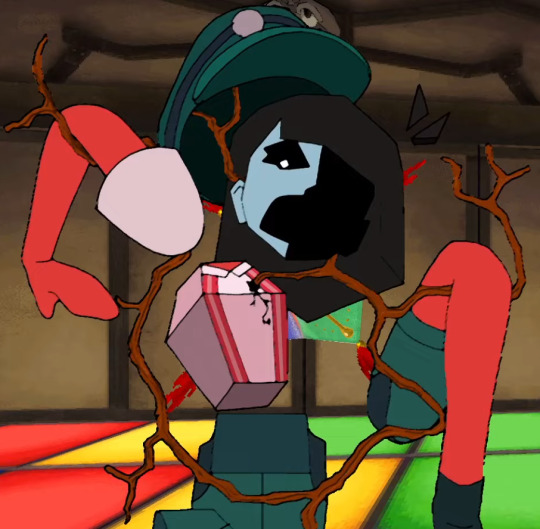
Her limbs get tangled in gnarled branches emerging from her heart. In these moments, she is fighting against herself. Are the branches restraining her from performing her duties, representing her intrusive desire to lose her worries in the vore disco Purge Event? Or are the branches the opposite, her sense of responsibility unnaturally forcing her not to partake in any of the frivolity?
Honestly, it's too soon to tell exactly. Regardless of the specifics, my personal takeaway is that her work ethic probably stems from some disaster that she could have averted if she were more dutiful. Yet she is still at odds with herself, perhaps yearning to live her life in the carefree way that she (probably) used to. Anyway. That's my analysis/interpretation of ENA herself. But I'm not done with this post yet. We've barely touched the subject of...
2- The Genies of the Doors

Beyond each Door lies a land governed by a Genie. In keeping with the 'digital' theming of the series, I've taken to calling each land beyond a Door a "Domain".
Beyond the Lonely Door is the Domain of the recluse Theodora.
Beyond the Crowd Door is Domain of the deviant Pierro.
And lastly, beyond the Horse Door lies the Domain of a fresh corpse.
Therein lies an interesting issue: Genies, while powerful granters of desires, can be killed. Not only that, but one person you can question at the start of the game has this to say: "No Pierro the Genie, no town." This implies that their existence somehow reshapes the world around them, fitting for such powerful entities. So... what does that imply about a Genie getting killed? The game branches twice in the first chapter. The first branching moment is whether to go to the Purge Event or to complete all the sidequests to unlock the Humanboard and ascend to the orb in the sky. These two branches end up leading to the same destination, the nexus outside the Bathroom. Here, the game branches a second time...

If you fail to cross the river (or interact with the puking guy on the other side. fuck that guy he made me do even more runs.) you end up taking a roundabout path to your destination, and you ultimately find that Theodora, the Genie of the Lonely Door, has died at the bottom of what seems to be a well.
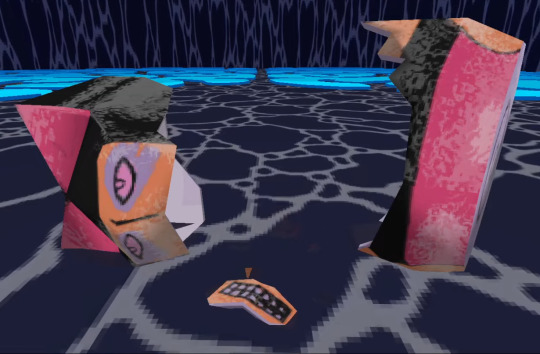
But hang on... If you successfully cross the river and go directly to the Bathroom, Theodora is alive and well! In the well! So what gives?
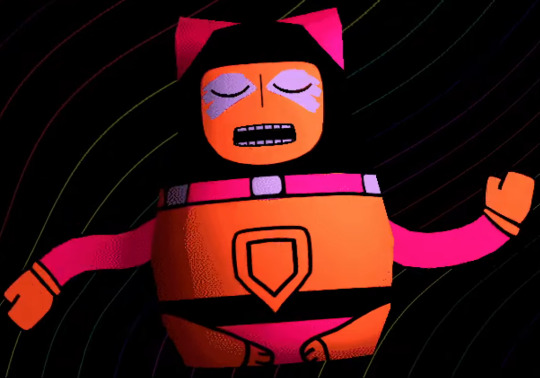
Well, after your meeting with her in either branch, the world begins to change. Places begin to lose their definition, becoming either distorted or changing into pure white geometry. Landmarks become clipart drifting in the air. Real estate investors swoop in on the newly freed up land. The Domain of Theodora is no more, and the Lonely Door is closing.
Many of the people are gone, replaced by familiar strangers.
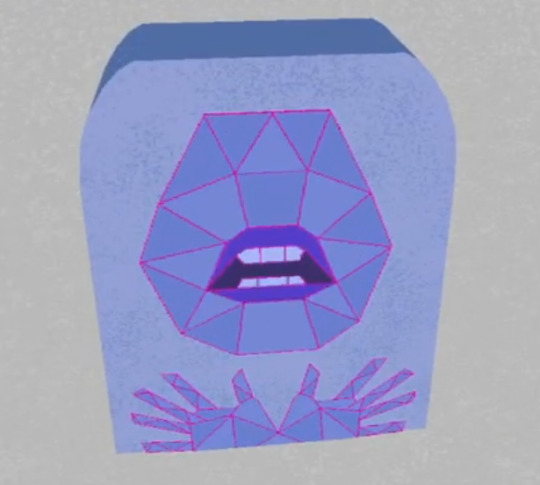
...I would like to take this moment to point out that the main theme song of the game, Anemoia, is a word meaning "Nostalgia for a time or place that one has never known."
Anyway, this inevitable loss of identity seems to imply that no matter which route you take, Theodora dies. Whether you're too early or too late, ENA doesn't find out who or what killed the genie. Between this and the murder of the unnamed third genie, there is some malicious entity just barely out of sight, slaying genies for unknown reasons. When considering what this could mean for the story down the line, I recall a certain line spoken by a certain goblin of a girl.
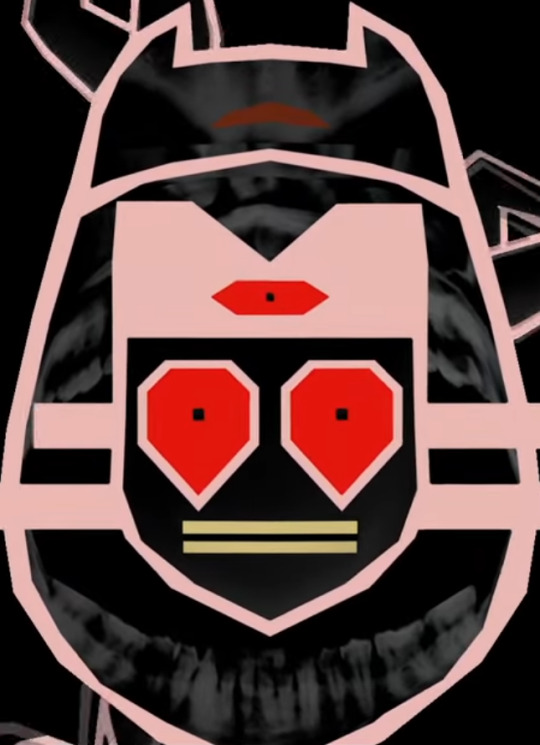
"Rude entities like you get punished for the sins of others." Someone is maliciously reshaping the world. And if these acts are as disastrous as they seem, then ENA is in a prime position to take the fall in their stead. She's already known to have caused some kind of calamity, and she's attempting to seek audience with the genies as they're actively being killed off. Should we meet with Pierro in a later installment, I imagine that things will take a swift downturn from there. It's a shame we don't know anything about the third genie...
...or do we? *Vsauce theme*
3- The Shadow of Ur-ENA
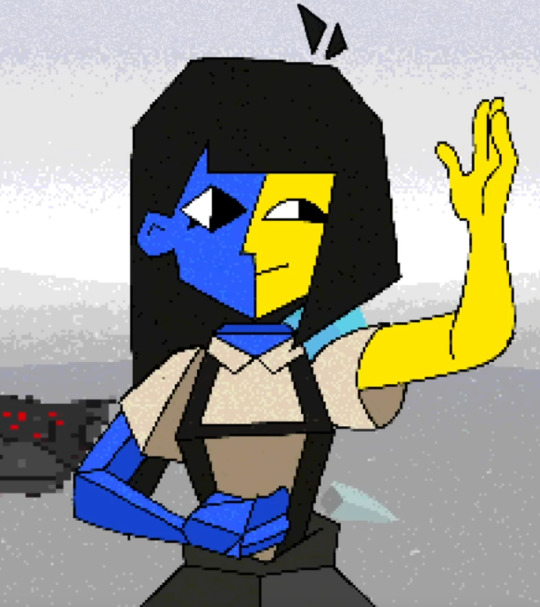
The connections between Dream BBQ and the webseries are few and nebulous... but they are there if you look in the right places. The Extinction Party is mentioned by one of the taxi driver's heads, and the location of that episode can be briefly spotted behind one of the doors of the Purge Event. The Domain beyond the Lonely Door starts morphing into the setting of Auction Day. But there's one point of connection that's been nagging at me... and it's pretty obtuse 🐬
youtube
Dialing a hidden phone number, we're met with Phindoll....'s answering machine. The message explains that he's looking for some kind of employment. Perhaps he suddenly lost his job? Who was he working for back when we saw him last? ...Oh, yeah. Runas. That wish-granting entity... on the other side of a... Door... ... The Great Runas might be fucking dead, guys.
We've now seen implications that this game takes place before Auction Day... but after Temptation Stairway. If linear causality has any role in this story, it's as a horrified onlooker.
Of course, this can be reconciled if Runas turns out to be the new genie that replaces the murdered one. But dialogue early in the game suggests that temporal shenanigans may be afoot. After all, the low-poly lady at the desk claims...
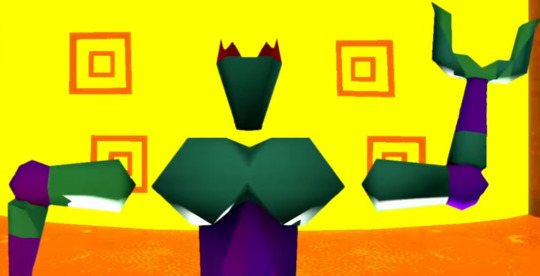
"You are too late! The Boss isn't even born yet!"
She's... a very blunt, straightforward person. None of her other lines are nearly as ambiguous and confusing as this one, so I'm inclined to take this line at face value. We are in no position to be making assumptions about how concepts like time even work in this setting. So what does this all mean? ... ... I dunno. We only have chapter 1 to work off of, after all.
But if Runas was in fact the murdered Genie, then there is one suspect in particular that pops into my mind. Someone who has met Runas. Someone who was... unimpressed. Dissatisfied. And found herself trapped inside his domain for a long, long time.

That's all for now. There's some glaring points in the story that I simply didn't have enough insight on to really remark upon. (Was that the Holy Code in the ending cutscene? What does ENA's body-hopping power entail? What was with the other ENA in the sewers, and who was she talking to?) Also at this point, my fingers are snapping in half from typing out all of these thoughts. A lot of this was just my personal interpretation, so don't be surprised if it clashes with the analysis of other people. In all likelihood, when the future chapters come out, I'll look back at this post and laugh at how dumb I was.
157 notes
·
View notes
Text
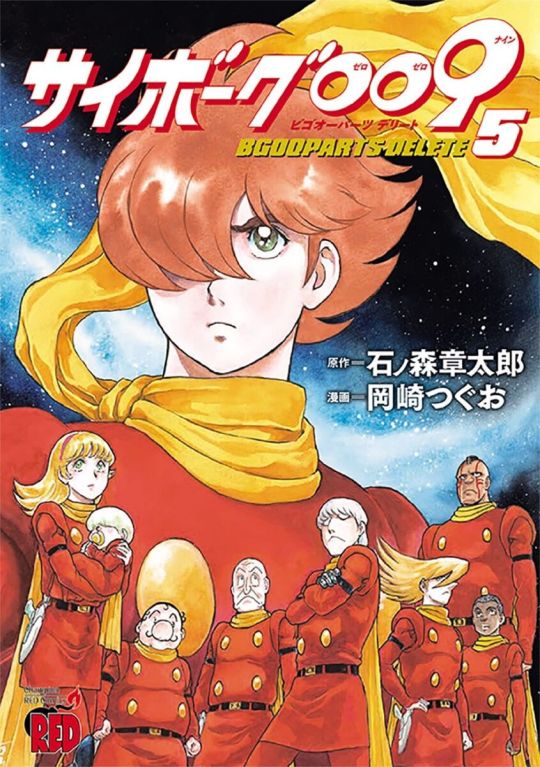
Cyborg 009 BGOOParts Delete (2020) - Volume 5
Finally done with this slog...well at least until it gets translated. I'll probably read this again in English if I ever get the chance because I feel like I missed a lot of what was happening.
Really didn't expect this entire series to just be the Mythos stuff, how lame. Why couldn't they just come up with new material? Oh well...
Ch. 29
Oh boy...more monologuing. It's a monologue off between Hera and Zeus and they just ramble on and on about the creation of the Mythos cyborgs. Zeus says he gave downtrodden, vulnerable people power and Hera's like "no bitch, you just enslaved them!" This whole manga series coulda been an email...
Helena does that weird "gay to be straight" thing at the end. As in, she kisses Francoise so she can kiss Joe indirectly. Okaaay...
Ch. 30
The numbers cyborgs take down the Atlas-type robots Zeus summoned using ~the power of teamwork~
Joe helps Apollon get out of the line of attack and Apollon has one of those "why are you helping me? We're enemies!" Cliche moments. I feel like we've gone through this about a zillion times now.
Ch. 31
I think this artist is horny for Artemis based on the sultry way she's drawn over and over. Also, they may or may not ship Joe x Apollon because there are a lot of tender moments between them. With how pretty they're drawn, it feels like fujoshi bait. (Maybe I'd ship them if they weren't bland, flat characters lol)
Apollon helps Joe take down the Atlas-type robots, Zeus talks about the benefits of robots vs. cyborgs (they don't betray you and aren't emotional) and then Apollon gets obliterated and the Atlas-type robots start attacking each other (because their ability to recognize allies began to malfunction).
Ch. 32
With all other enemies taken out, Zeus turns into his ~final form~ and starts zappin'. Helena gets caught in the crosshairs and the number cyborgs plan their revenge.
I'm kinda confused about Hera's role in all this. She's been judging him this whole time but also not exactly working against him...? I guess she's too weak to do that.
Ch. 33
Okay, so maybe that wasn't his final form lol. More battle nonsense happens and Joe manages to shoot Zeus in the head with his own laser, but then he transforms into Apollon
It really feels like the writer couldn't really think of anything to do with this story, so they just draaaaged out the battle as long as they could. Also, the dialogue continues to be hella repetitive. If I hear Hera/Zeus say "the Mythos cyborgs whose fate is under your control" one more time I'mma snap.
Ch. 34
Zeus monologues some more, transforms into an abomination and then Joe one-shots him with help from Hera's amulet lol. Pretty anti-climactic but I'm glad that's over with.
Prof. Gilmore randomly showed up to be like "I'm worried about Ivan." Thanks for your input, Gilmore.
We get one final Hera monologue and then she puts Prof. Gaia's soul back in his original body so that they can die together I guess.
It's revealed that Prof. Uranus' first name was Tyrone...did they just google "black guy name" for that one? That doesn't seem like a fitting name for his age/time period, but what do I know I guess...
Ch. 35
This chapter was the epilogue and it got all weird and existential. They talked about fighting alternate versions of themselves in other universes and about their minds fusing together to become one being (??). They also referenced an "angel of despair" a few times which reminded me of the angel from 009 Re:Cyborg. This all seemingly came out of nowhere...
Francoise kisses Joe to "pass on Helena's message." She tells everyone to close their eyes, but Ivan tries to sneak a peek. I feel like that was the one cute moment in this entire series lol
For the human characters everything's back to normal and their memories were wiped. The implication is that the numbers cyborgs will keep on keepin' on in the multiverse. Guess this franchise will never die lol.
Obviously, I didn't really enjoy myself reading BGOO Parts, but I'm happy for the real fans out there that they have some new content to chew on. As I said in my previous posts, the art was very nice, but the writing/pacing/story all kinda stunk. Not a lot of interesting character moments either. Onto the next!
7 notes
·
View notes
Text
Dr. Tarr's Torture Dungeon (1973)
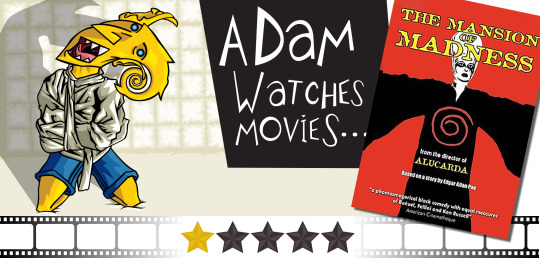
While I didn't enjoy this film, that doesn't mean you won't. No matter what I say, the people involved in this project did it: they actually made a movie. That's something to be applauded. With that established...
Anyone who sits down and excitedly wonders what horrors await inside Dr. Tarr’s Torture Dungeon will be disappointed. The alternate title of The Mansion of Madness is far more suitable and more properly sets you up for a film that remains lackluster regardless of what you call it. This movie’s plot is too obvious and too badly written for you to care what happens in the end.
Reporter Gaston LeBlanc (Arthur Hansel) is writing an article about famed psychologist Dr. Maillard (Claudio Brook). Arriving at Maillard's asylum, LeBlanc finds the doctor’s methods unorthodox to say the least. Captivated by the beautiul Eugénie (Ellen Sherman), LeBlanc fails to realize the inmates are in charge of the facility.
Loosely based on Edgar Allan Poe's darkly comedic The System of Doctor Tarr and Professor Fether, the film has a good premise. Imagine visiting a place only to discover that the patients have taken over. You're surrounded by madmen and can't escape. That's scary. To make it work, you need two things. First, a slow-boil plot. If everyone comes out of the gates raving like lunatics, you’ll figure out the whole thing immediately. Second, you need an intelligent protagonist. If you want to make the audience laugh, they should be dumb but if your goal is to scare, Gaston needs to be sharp. Once the deception is revealed, he needs to fake his way through this ordeal and exploit every means of escape possible. That’s what the audience will be doing mentally. Unfortunately, director Juan López Moctezuma fails to do either.
The Mansion of Madness a.k.a. House of Madness a.k.a. Dr. Tarr's Torture Dungeon does nothing clever or new with its concept. As Gaston approaches the sanitarium, the friends traveling with him suddenly have to cut their journey short. Obviously. If they stuck around, they'd reveal that the man in charge of the asylum isn't Dr. Maillard at all. They're useless until captured by the lunatics. At this point, they become worse than useless and star in a subplot that has no impact on the main story, whatsoever. They prove that all of the sane people in this movie are complete idiots. At one point, one of them escapes. The man’s all tied up and hopping around in the middle of the forest, trying to elude the insane rapists who roam the grounds surrounding the mental institution. He should look for a way to untie himself. Instead, he screams for help, practically begging to be recaptured. Here's a free lesson for all the screenwriters out there: audiences want to see a part of themselves in the on-screen characters. Having them behave like they have no sense of self-preservation is a surefire way to make everyone hate your movie.
That subplot is ultimately nothing more than padding and it’s not the only example of director Juan López Moctezuma struggling to find a way to make his movie feature-length. At one point, Eugénie and Gaston become romantically involved. So involved they profess their love to each other. They’ve exchanged fewer than 5 lines of dialogue. It’s ludicrous and another reason for you to dismiss the movie entirely. It doesn't stop there: unnecessary bits of backstory, garish opening credits, unbelievable behavior from our heroes, mountains of coincidences, and so on and so forth. Dr. Tarr's Torture Dungeon is a complete misstep any way you look at it. (English version, January 15, 2021)
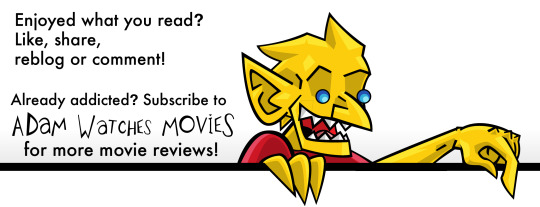
#Dr. Tarr's Torture Dungeon#The Mansion of Madness#House of Madness#Juan Lopez Moctezuma#Carlos Illescas#Gabriel Weisz#Claudio Brook#Arthur Hansel#Ellen Sherman#Martin laSalle#1973 movies#1973 films
1 note
·
View note
Text
Kaeya and Diluc’s brotherhood
I still see many people claiming that Kaeya and Diluc don’t feel like brothers or that they hate each other etc. So in this post, I’m going to compilate all the evidence I’ve found on why they don’t hate each other and how they show that they care.
NOTE: This is just a post meant to show evidence as objectively as possible taking into account official info that we have until this point.
Edit: This was written back in January 2021, so bare in mind that there might be new info that has been released ever since, but I’m not going to modify this post. Maybe I’ll do a Part 2 in the future, we’ll see.
Edit 2: I guess this post kinda counts as Part 2 since we’ve gotten so many new tidbits about them.
Before we begin: I will be using English translations for the images shown, but I’ll be also using Japanese translations, especially when I find the English translation to be unreliable. While the English translation is not actively wrong, it does take some liberties in some of the lines and this can lead to wrong interpretations. I know that Chinese is the original language for both the webcomic and game, but unfortunately I don’t know Chinese. However, I do know Japanese and from my experience, I’m sure the Japanese translation is more accurate than the English one. If you consider this to be a problem then I’m sorry but that’s how I’m going to do this analysis.
----
First of all, we should start with the most obvious thing. Kaeya was adopted by Crepus, it’s literally written in his in-game profile:
“Kaeya Alberich is an adopted son to the Ragnvindr Family, the renowned wine tycoons.“
We don’t know if he changed his last name at some point or if he has always been an Alberich, but that is not important. Crepus just saw a boy who had nothing and offered him a home and family. And this makes him Diluc’s adoptive brother by default.
Why don’t they show this brotherly bond? Because as we all know, they had a big fight after Crepus died and Kaeya confessed that he was a spy from Khaenri’ah. After that Diluc left for 3 years, so obviously a lot happened in that period and by the time Diluc came back, it was difficult for them to just talk to each other like nothing had happened.
But do they hate each other? NO. There are several instances, both in the webcomic and the game that show they aren’t so hostile and actually care for each other.
Since the webcomic happens before the game, let’s look at that one first.

The first time we see Kaeya in the webcomic is precisely at Diluc’s manor. Now, if Diluc hated him so much, why have Kaeya there instead of other knights? Note that while they don’t talk to each other so much here, they don’t show hostility either.

Kaeya knows exactly what Diluc has done (he attacked the Fatui guy) but remains silent. Also, yes, in this dialogue Kaeya refers to Crepus as Diluc’s father, but this is because they’re talking in public. Since their fight, they don’t want to refer to each other as brothers again, so they try to talk to each other as if they’re just acquaintances.
Now comes the part that confused me and many people in the first read.

This is not an accurate translation. I’m assuming whoever translated this wasn’t sure what term to use here, so they went for “like brothers”. In Japanese, he says “My adoptive brother Diluc” here, revealing their actual relationship in this line.
Now, after this, Kaeya witnesses something that may be related to Crepus’s death. And what does he do? He goes to see Diluc and give him the information. Because he knows Diluc has been investigating the Fatui and wants to know the circunstances of their father’s death.

He goes to the manor and he’s greeted by the butlers and maids as Diluc would be, because they still consider him one of the Masters of the house.
Now, I want to point a few things of this translation:


Kaeya refers to himself multiple times as “your bro Kaeya” and Diluc ends up denying this. This is actually something I only found in the English translation. In Japanese, Kaeya doesn’t call himself that, nor Diluc says that either. At this point they just treat each other like strangers. Diluc treating him like just another knight and Kaeya staying distant because he knows that’s what Diluc wants.
Also, cute to see that the maids really like Kaeya. This translation isn’t accurate either, but they do tell him to “Please come back again!” (In Japanese, Kaeya just says “Sure”). Adelinde in the game often says out loud “I wonder if Master Diluc and Master Kaeya will get along again...”. The people of their house still care about them both.
(Edit: I’ve confirmed that Adelinde’s line is not said in English, she says something completely different than in Japanese, at least I haven’t heard her say it after several minutes of her talking. However this is said in Chinese, as I clearly can understand their names being said in her dialogue.)

Now at this point there’s no much interaction between them but we see again how Kaeya goes to see Diluc and give him information.

Note that it is always Kaeya the one who goes to see Diluc. We’ll see more examples of this later on. It’s pretty clear that Kaeya feels very guilty. He knows Diluc was hurt by his actions and feels responsible for how Diluc is nowadays: a very lonely person who doesn’t trust other people easily. Still, Kaeya wants to help him, that’s why even though Diluc acts coldly, Kaeya still goes to see him everytime he finds out something of interest.

When Diluc finds out that Kaeya does have something of interest to say, he always offers him a drink as a means to say “Fine, let’s talk”. Yeah, this is still a little cold but Diluc listens to Kaeya and trusts what he says. He even goes so far as to work together with him to pay back the Fatui. Kaeya does this because he knows how much Diluc despises the Fatui and wants to take revenge, he’s always trying to help Diluc as much as he can.
And this all ends up with... the vase.

Basically, a vase broke when Kaeya visited Diluc in his manor, and he told Diluc he would buy him another one. He does keep his word and buys him a new, eccentric one. Diluc insists that he told Kaeya that it wasn’t necessary, but Kaeya also insists that Diluc should keep it. Why does Kaeya insist so much? Well because inside the vase is Diluc’s Vision.

When Diluc left the knights he also gave up his Vision. But after his return, Kaeya knew just how much Diluc still wanted to protect Mond and enact justice. He knew that Diluc needed his Vision back, but Diluc is too prideful to just ask them to give it back. So Kaeya was the one who returned it to him. If this doesn’t show how much he cares for Diluc, then I don’t what to tell you.
This vase is so important that you can find it in the game. And not in any old place, you can find it in Diluc’s manor:

Would you say that Diluc would keep this if it wasn’t important to him? Why keep a vase that’s so different from the rest of his own home? Because Diluc cares. That vase is a present from his brother, who used it as a means to return something important to him, of course he’d keep it.
Now, we’re going a little ahead, but everyone knows about this little scene, where Kaeya asks Diluc about the vase.

English translation exaggerates the phrasing but he’s basically asking “Did you sell that vase too?”, to which Diluc says “I don’t remember”. Diluc is just tsundere here, not wanting to admit that he still has the vase, and it’s in the entrance of his own manor. Good old Pallad here knows that at least, a shame that we don’t see more of this conversation.

Well, going forward... We see a few more interactions between Diluc and Kaeya in the game. The first one happens after Kaeya joins us, in which Diluc comes out of nowhere to make his epic entrance and trash an Abyss mage. Not much here, it’s just an introduction for him as he makes his typical comment about the knights not been very useful.
The next time we see an actual interaction between them is in Diluc’s mission. Where Kaeya wants to test Diluc, to see how far he’s willing to go to continue protecting Mond. But Diluc misunderstands, and believes that Kaeya just wants to get back at him. He may think that Kaeya wants to get revenge on him because of what happened in the past (as Diluc was the one who started the fight after Kaeya confessed).

After the ordeal, we discover how Kaeya just wanted to see Diluc’s resolution. Diluc still believes that Kaeya may tell his secrets to the knights though...

...but of course Kaeya denies this.

And it makes sense. Because think about it. Do you really think that anyone other than Diluc knows Kaeya’s biggest secret? I don’t think so. If the knights knew that Kaeya was supposed to be a spy from an enemy region, they would never have him as a knight Captain, they would most likely have imprisoned him or exiled him. Obviously Diluc didn’t say anything. Why though?
Well... two reasons I think. First, Kaeya hasn’t done anything wrong, not yet anyway. He hasn’t betrayed Mond, he’s always helping it. So until Kaeya does anything suspicious, Diluc doesn’t have any reason to expose him. The other reason should be obvious: because he still cares. Diluc knows what would happen if people knew about Kaeya’s origins. So he keeps quiet for now, and Kaeya does exactly the same for him. Kaeya keeps secret of his activities as the Darknight Hero.
They both know secrets that can cause problems for the other, but choose to remain silent, because they know the other isn’t doing anything wrong.
And I want to remark what Kaeya says at the end of this dialogue:

This is very important. Firstly, it’s the first time (in the Japanese translation at least) that Kaeya calls Diluc by his name without any title, symbolizing that he’s talking very honestly here. And second, what he says. Kaeya is happy to see that Diluc is not alone anymore and has someone to help him. Why? Well... because he cares. He knows how Diluc has been working alone for years and doesn’t trust people anymore, yet now Kaeya sees how he has found someone that he can trust, someone that can help him: the Traveler.
Kaeya is very pleased to see that his brother is no longer all alone, as he knows Diluc doesn’t want to be around him or other knights. Even if Diluc shows that he cares about some individuals... such as Jean, as he helped in her party during her quest. And let’s not forget that Kaeya was the one who planned that party, that means he went to see Diluc and asked for his help and Diluc accepted.
Finally, let’s go back to that one scene in Venti’s mission. Because first of all... they are drinking together.

You really think Diluc would go and drink with Kaeya if he hated him? This scene shows that while they’re still distant, they do see each other sometimes and even drink together. Diluc doesn’t seem uncomfortable, like he’s been forced to drink with him. No, they look like they just decided to drink together with other guys. This shows that their relationship is healing a little. Furthermore...

Now this is yet another case of the English translation exaggerating things. He doesn’t sound that agressive in other translations. What he’s actually saying here is “You’ve always loved selling things. You’re the one who sold Father’s mansion, right?”. It’s just a fact, it’s not agressive. He’s not trying to provoke Diluc with that line. Diluc doesn’t seem affected by it either, he answers with his usual tone of voice, they’re just chatting.
However let’s ignore for one moment the phrasing and focus on what’s important: Kaeya calls Crepus “Father” here. For the first time in the conversations we’ve seen, Kaeya has openly called him “Father” in front of Diluc, and Diluc doesn’t say anything, as if that’s a natural fact. Again, it’s another proof that their relationship is not as bad as it seems. And for once this is not a mistranslation, in Japanese he also says “Father” here (Tou-san to be concrete, that’s exactly how Diluc refers to Crepus as well).
----
And this is all the scenes that we have of them so far. So let’s recap.
Kaeya and Diluc had a fight, and they’re obviously not the same as they once were. They’re still a bit bitter and don’t trust each other completely. However, Kaeya definitely shows remorse, and he actively reaches to Diluc to help him, be it directly or indirectly. It’s clear that Kaeya cares for Diluc, a lot.
Diluc’s case is more difficult, as he seems to be way more stubborn. But, we still see that while he keeps his distance with Kaeya, he hasn’t been actively agressive to him. He listens to what Kaeya says and trusts his information. They also work together when they have to. And he kept the vase that Kaeya gave him too.
So yeah, right now their relationship is not ideal but we see how little by little they’re showing how they still care about each other. I’m sure that in future missions we’ll eventually reach a point in which the Traveler discovers their past together and maybe they’ll help out. Remember: the Traveler is looking for their sibling. Sibling relationships in this game are very important, and we have a lot of them: Aether and Lumine, Jean and Barbara, Childe and his brother (and siblings), Albedo and Klee (Albedo says he sees Klee as a real little sister) and of course, Diluc and Kaeya. And this is just so far, I’m sure they’ll be more in the future.
I’m confident that by helping Kaeya and Diluc (especially Diluc), we’ll help them be more honest and work to repair the damage that was done. As Kaeya is from Khaenri’ah, he’ll be important later on, and we know for sure that one day he’ll have to make his choice: Mond or Khaenri’ah. But I just can’t see Kaeya betraying Mond, not when he works so hard to protect it and he shows so much care for his adoptive family. Eventually Diluc will start to trust him again. And even if they don’t go back to be as close as they once were, by the end of the game, they’ll be brothers again.
#Genshin Impact#Kaeya#Diluc#Ragnvindr bros#This is merely informative#I know that it's not completely objective but I've done all that I can to find all evidence#I just hope that people read this and understand their relationship a bit better#Kaeya Alberich#Kaeya Ragnvindr#Diluc Ragnvindr#mine
403 notes
·
View notes
Text
BUFFY REWATCH - S04E22 - Restless
Tara: “I think it’s strange. I mean, I think I should worry that we haven’t found her name.”
Willow: “Who, Miss Kitty?”
*shot of their kitten, playing with a ball of red yarn in slow-motion*
Tara: “You’d think she’d let us know her name by now.”
Willow: “She will.
*looking down at Tara*
She’s not all grown yet.”
Tara: “You’re not worried?”
Willow: “I never worry here. I’m safe here.”
Tara: “You don’t know everything about me.”
Willow: “Have you told me your real name?”
Tara: “Oh, you know that.
*Willow smiles, reaches for something. Shot of a paintbrush dipping into ink jars*
They will find out, you know. About you.”
Willow: “Don’t have time to think about that. You know I have all this homework to finish.”
*the camera pulls back so we can see Tara is lying face-down on her bed, naked, and Willow is painting on her back*
Tara: “Are you gonna finish in time for class?”
Willow: “I can be late.”
Tara: “But you’ve never taken drama before.
*shot of Willow dipping the paintbrush again, moving it across to Tara’s back, which is covered with Greek symbols*
Might miss something important.”
Willow: “I don’t wanna leave here.”
*Tara twists back to look at her*
Tara: “Why not?”
*Willow stands up, looking down at Tara. She turns away toward a dark red curtain. Walks over to it*
Willow: “It’s so bright.
*pulls back the curtain to reveal a brightly sunlit desert. The light falls on Tara, who looks over. Looking back at Tara, still holding the curtain open*
And there’s something out there.”
*shot of the desert, straggly plants, rocks. We briefly see something (someone?) moving, then it’s gone. Shot of the kitten stalking forward toward the camera, in slow-motion*
I have been so anxious to get to this episode and write my meta. For all the time I’ve brought up Willow’s insecurities, this is the one and only episode that lays them all bare for everybody to see, if - and this is important -, you are clever enough to decipher the code of visual symbolism and possess the ability of interpretation. Pretty much all of the episode ‘Restless’ requires you to interpret what you see. You’re not told straight-forwardly what the dreams, each of the core 4 Scooby members have, are about and that’s precisely what I love about it and why it is probably my most favourite episode of the whole show.
Now, obviously, I’m only going to be talking about Willow’s dream in the episode because if I were to do an analysis of every character’s dream, I’d be here all day and this recap would be incredibly long. I would suggest watching YouTuber Passion Of The Nerd’s analysis for it to get the whole picture. Much of what I will write here will draw from that as I agree with quite a lot of it and think it makes a lot of sense in understanding each character. Every character has fears, worries and insecurities, and that’s what these dreams are specifically about, but Willow’s go much deeper than can be witnessed in all of the show due to her “hiding” them under a “thinly-veiled” persona of who she wants to be. For the most part, you only get to see who she wants you to see. It is not until this episode that all of Willow’s real thoughts and feelings take center-stage - quite literally. There’s a reason why both her dreams in ‘Nightmares’ and ‘Restless’ have her performing on stage. The former, being more about stage fright and about wanting to go unnoticed. The latter, about acting like something she’s not and “putting on a show” of confidence and security to the other characters, who she fears knows about “the real her”, and the audience watching her. Now, “the real her” is as ambiguous as this entire dream sequence is - meaning: it depends on your point of view who Willow is. And this is why I clash with @confusedguytoo about Willow often regarding my views and opinions on Willow. They see something different to me. However, I’ll let them better explain that if they so wish to. I’ll only explain what I see - in Willow - and in this episode.
I relate Willow’s insecurities to her accumulation of power and need for control. For me, much of what I interpret in ‘Restless’ ties in and very much foreshadows Willow’s magic addiction and ‘Dark Willow’ storyline in Season 6 because, to me, Dark Willow is less about the Magicks and more about power and rage, (Anya interjects here: “and vengeance, don’t forget vengeance”). So I will go through the meaning of Willow’s dream in ‘Restless’ from the way I interpret it and in my own words:
Starting off, we have Willow sat on Tara’s bed with Tara (well, actually Tara is laying down on it and Willow is sat on it.) Tara is turned away from Willow as Willow paints some writing on her bare back (see Passion Of The Nerd’s analysis to know what is being written because it’s very significant to the scene.) This part of Willow’s dream has more to do with Tara than Willow, but it’s important to remember that it’s all from Willow’s perspective. Willow worries that there’s something about Tara that Tara isn’t telling her. Something she’s not “facing her” with and letting her know bothers her. But other than that - she has no worries. She feels safest with Tara and, as I’ve previously mentioned in another recap, is much more invested in the relationship they share than Tara is at this point in it. And the scales don’t actually equal in that because Willow becomes uncomfortably and unhealthily invested in that she starts to abuse Tara in such a way where she wants to make sure Tara pays the most attention to her. And magic has always been the best way for Willow to have “her will be done” well before Tara entered the picture of her life. And so, she knows it’s her bread and butter to getting her way.
Moving on, we now see Willow walking the halls of Sunnydale high school and Xander and Oz are in the dream. No Tara. Meaning this part of the dream is something passed in her life but still very present in her mind. Although this is of the past, the dialogue between all 3 characters is about Willow’s then-future. There is mention of Tara and of the drama class they will take in college. I interpret this to mean that Willow can’t entirely let go of what was to focus on what is or what will be. Hence why Oz is in the scene and why he says “Oh, I’ve been here forever” when Willow asks him if he’s ever took the drama course - at which point we see Willow trying to take something out of her locker but can’t seem to get it open. I interpret this to mean she’s locked out and cannot access that part of her life anymore despite still thinking about it, and specifically Oz, in it. You see, Oz may have followed Willow to college, but he never stayed. Their relationship was only one that existed in high school and Willow has regretfully moved on from Oz and entered a new relationship that exists in college and will last beyond that. She cannot access her high school life anymore. She cannot access Oz anymore. Thus, their love affair was tied to their high school life and Willow no longer goes there.
At this point we see Willow walk out of the frame, leaving Xander and Oz behind, to stand backstage of a production in their drama class - of which Willow has never even rehearsed for and hasn’t even had her first drama class yet. And the characters of Harmony, Riley and Buffy are dressed up in costume ready to perform the play and tell Willow that she’s late but she’s “already” dressed in “costume” and “already” in “character”. Giles then enters the scene as the stage director and his dialogue in rallying his actors to get ready to perform reveals that this play is all about Willow. In fact - she’s the main character in it (go figure) and everybody in the audience, including the cast, is there to watch her perform.
“Acting is not about behaving, it’s about hiding. The audience wants to find you, strip you naked, and eat you alive, so hide.” - Giles.
Next Willow goes behind the stage curtains (which are red to represent a vagina, apparently, according to Whedon in the commentary track for ‘Restless’) and finds Tara among them with her who tells her that things aren’t going very well. Willow says that drama class is not being done in the “proper” way, she doesn’t know what to do, and the play’s starting soon. Tara then tells her that the play’s already started and that’s not the point anyway. Willow doesn’t understand. As the play happens without Willow, Tara disappears, and what was following Willow attacks her.
Buffy saves her and we go back to Sunnydale high school. This time we’re in a classroom. It isn’t clear which class but it’s presumably English as Willow reads out a book report on ‘The Lion, the Witch and the Wardrobe’. Before she does that though, Buffy tells Willow that the play is long over and asks her why she’s still in “costume”. Willow responds that it’s not a costume, she’s just in her outfit of the day. Buffy tells her that everybody already knows about her and to take her “costume” off, to which Willow panics and refuses. Buffy rips her “costume” off of her to reveal her wearing the clothes she was wearing on the very first episode of the show. Now, Willow stands in front of a full classroom of her peers (both from high school, college, and the Scooby Gang) mocking her for her appearance and her reaction to being totally exposed to what she believes everybody perceives of her as the truth of who she really is. Still a shy loser. The dream sequence ends with what was following Willow and attacked her throughout; the first Slayer sucking out her soul and leaving the real Willow paralyzed in her sleeping state. Unable to escape from her personal Hell.
So what does it all mean? Well, it really all depends on the way you interpret her dream. Some things about Willow and what she thinks and feels are clear, some are not. But how I’ve interpreted her dream in ‘Restless’ is that Willow, despite appearing a much more confident, secure and assertive person, doesn’t have any belief in herself when it comes to her value and requirement of her from her peers, friends and lovers… Or everyone that’s not her. Her need for validation in who she is and what she can do from everyone. Her worthiness in her work. Her ability and capacity to love. Her appearance to whoever perceives her. Especially the ones she loves. And her insecurities run so deep in this that even she doesn’t recognize them. She’s not aware to how much she’s acting like someone she’s not in order to please, in order to have attention, in order to feel of use to people. Now, it is not that she is still the loser. She’s definetly evolved into a much more worldly and well-rounded person since her high school days. Stronger, smarter, wiser, and more confident. It’s just she doesn’t believe in it and she absolutely fears no one else does either. In her mind she’s still the lonely nerd and she’s doing the most to make sure people don’t see that. Even though she has the belief that they do and always will. So her need for power and control all stems from these deep unconscious insecurities. Magic just happens to be the most effective tool for her to accumulate this. And she only becomes addicted to it in Season 6 because she relies on it to make her special. Even though she’s special as she is - with or without magic - to which Tara does her damnedest to make her aware of and believe. And she’s about the only person in the show that achieves it - until, of course, her death… Which, of course, triggers Dark Willow.
Willow's need for power and control as Dark Willow is channelled through rage and pain and so no amount of it is enough. Willow isn’t enough without Tara. None of these fears, worries and insecurities are the truth of Willow. But getting her to believe in and trust in that is next to impossible. Tara is only capable of it because she’s the one thing in the show that Willow truly loves. Is truly committed to. Is truly invested in. And she feels like she means and is nothing without her, without her love, without her attention, without her validation, without her light. She abuses her the most because she’s the one person in all of the show that she covets the most. That she doesn’t want to be without, that she feels the safest and is the happiest with. That she won’t let leave her life. Yes, it’s unhealthy. But true love can be when there’s so much inner turmoil. When there’s such a storm inside threatening to be unleashed with every bad day. Every screw up. Every "spaz" feeling. That's what it stems from. A loser mentality.
That is Willow’s entire predicament throughout the whole show and why her character representation, development and evolution is the greatest, the most profound, the most detailed, the most poignant. This is a character that you absolutely fall in love with very early on. To see them go from that gentle-natured, quirky, inspiring and endearing person to one of the most abusive, frustrating, corruptive and destructive people is hard. Fortunately, they’re given the endgame they deserve and become the hero. They learn to balance both sides to who they are - the dark and the light - and they become exactly who they want to be. Someone of great power and control. Someone that is valued and loved. Someone that matters. Whether she believes it or not is up to you. 😉
youtube
#buffy the vampire slayer#S04E22#restless#willow rosenberg#alyson hannigan#tara maclay#amber benson#daniel oz osbourne#seth green#xander harris#nicholas brendon#buffy summers#sarah michelle gellar#rupert giles#anthony stewart head#passion of the nerd#analysis#insecurity#dream#episode recap#buffy rewatch#Youtube
60 notes
·
View notes
Note
I saw your post about the FA's translations, and I totally agree. Sometimes, when they do not translate accurately, is to make it sound better or cooler in English, but it just ends up taking away a lot from the context and characters. We know how one of the most affected character interpretations is Katsuki's, a main character, no less. And Izuku and Katsuki's relationship too, which is something super super wrong, considering is deeply intertwined with the main plot of the series, thus if someone misinterpreted their dynamic, this person would miss a bigass chunk of the message the story has.
Here is the panel you mentioned before btw
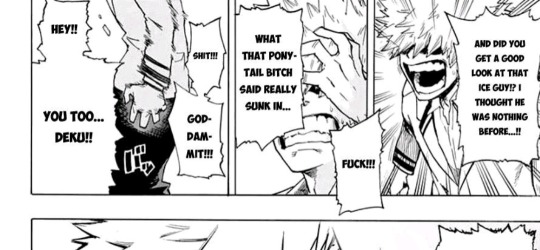
I remember when I read this, only 10 or 11 chapters into the manga (?), and I was like "...I'm...pretty sure this guy didn't say that" khshsjdhs
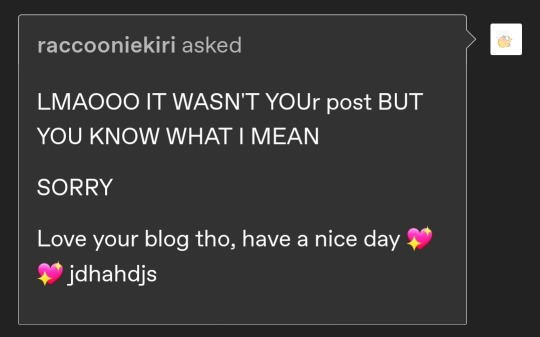
OK FIRST OF ALL LMAO HELLO MANG!! THANK YOU SO MUCH AND DW ABOUT IT I TOTALLY GET WHAT YOU MEAN !!
(this is your warning for a long post ahead!)
In any case, I still think you're very correct on this! Not to ramble a bit, but Horikoshi's particular talent in developing the plot of MHA is actually very very brilliant and there are a lot of blink-and-you'll-miss-it details that together, assemble the big picture of what MHA is.
Translations are such an integral part of being able to understand foreign media. MHA or otherwise. The simplest of details say a lot about a character and often times make or break a series because everyone knows that strong character dynamics are what carry even the shittiest of plots.
First and foremost, I want to clarify that because of the nature of fan translations and the fact that most of it is volunteer work/ written out of pure enjoyment of the manga--we shouldn't judge these fan translators too harshly (if at all) for interpreting it the way they want to. FA, as far as I can tell, is a fan-based group that works out of donations.
The first thing I wanna bring up is that when it comes to fandom and its works, there are two types: Curatorial and Transformative. Now, the transformative part is something that must be very familiar to a lot of you. Fanfiction, fanart, and most headcanons fall under Transformative Works (i.e. AO3) because they are all about transforming the canon world to fit each individual's personal preferences. Meta-analysis posts and Character Breakdowns are also classified under this.
Curatorial on the other hand are fandom interactions made with the explicit purpose of being as close to canon material as possible. This is working out the logic of quirks, for example, or memorizing as much canon content about your favorite villain as possible. These are more cold, hard undeniable facts that lend themselves to the DIRECT VISION the creator/author had while making this media. If you were to ask me my opinion on this, this would be the moment where I tell you that the Curatorial side of fandom is where fan translations should (for the most part) fall under.
What people need to know though is that oftentimes, fan translations do not.
Translating isn't and has never been a one-is-to-one process. There are hundreds of thousands of aspects in a language that make it so that it isn't perfectly translatable. Colloquialisms to sayings to dialects, to just plain-out words that don't have a proper English translation to them! Manga is made by and for a Japanese audience, so obviously in a lot of instances, there will be cultural nuances that will not be understood by anyone who hasn't immersed themselves in Japanese culture/language.
So what does this mean then for fan scanlations?
It means that a vast majority of translators teach themselves to only get the essence of the message. They take the dialogue as they understand it and translate it to something of their interpretation. When language and cultural barriers exist, translators do what they can in order to make it understandable to the general populace. This means making their own executive decisions on how they see a character speaking. In example, if they see Todoroki using very direct and impersonal Japanese--one translator might interpret it to mean that Shouto is stiff and overly formal, while another may see it as him being rude and aloof.
The problem is, translators are fans just like us.
Like with the image Mang posted above, the translator based the usage of curse words off of their understanding of Bakugou's character. The lack of foul language in the original Japanese might have made the translator think "Oh. There just aren't enough Japanese cusses for his character." And took that as an initiative to make Bakugou's lines more colorful and violent because this was working off of the image Bakugou had had at this point in canon.
But Codi! You may cry. Wasn't it proven multiple times that Bakugou prefers concise and short lines? They should've known better!
Yes. Maybe they should've known better. But tell me honestly in your first watch-through of MHA, did you perfectly understand Bakugou's character either? Did you catch the whole 'direct and no flowery language' aspect of his language when you first saw Season 2?
Most people don't. I only really understood this fact after I'd read multiple discussions of it and even double-checked the manga myself. These are the kinds of things that only become noticeable with a sharp eye and some time to scrutiny. But the fact of the matter is that when it comes to fan translations, the clout and recognition are always going to go to who can post the quickest.
Am I excusing erroneous translations? A bit, I guess. It's hard for us to go in and expect translators to catch all these errors before release when we ourselves only catch these errors like 4 months in with a hundred times more canon context than these scanlation groups did at the time of its release.
Still, there are plenty of harms that come with faulty translations.
When a translation is more divorced from the original's meaning than usual, it creates a dissonance between what is actually happening versus what the audience sees is happening. This looks like decently-written character arcs being overruled and rejected by most of the readers because of how 'jarring' and 'clumsy' it seems. By the time translators had caught on to the fact that Bakugou was more than just a ticking time bomb, we were already several steps into showing how significantly he cares for Deku.
The characters affected most by these translation errors are often those with the most subtle and well-written character arcs. A single mistake in how the source material is translated can make or break the international reception of a certain character to everyone who isn't invested enough in them to look deeper into the canon source.
It creates hiccups in plots. Things that seem out of character but really aren't. Going back to MHA in specific, the way that inaccurate translations hurt both the 'curatorial' and 'transformative' parts of the fandom is that people have begun to cite them as proof of the main cast's characterization.
Bakugou and Todoroki are undeniably some of the biggest examples of mistranslation injustices.
Katsuki, in a lot of people's minds, has yet to break out of the 'overly-aggressive rival' archetype box that people had been placing him in since Season 1. One of the most amazing aspects and biggest downfalls of Hori's writing was that at first, nearly every character fit into a very neat stereotype for Shonen Animes (Deku being the talking-no-jutsu sunshine MC, Uraraka being the overly bubbly main girl, Todoroki being the aloof and formal rival). He made the audience make assumptions about everyone's characters and then pulled the rug beneath our feet when he revealed deeper sides of them to play around within canon.
What made this part about Horikoshi's set-up so good though were the many clues we were given from the very beginning that these characters were more than what they acted like. Even from the very first chapters, for example, we learn that Katsuki (as much as he acts like a delinquent) dislikes smoking because it could get him in trouble.
That is just a single instance of MHA's use of dialogue to subtly divert our expectations of a character.
Another example is when they replaced 318's dialogue of the Second User saying that Katsuki "completes" Deku with him saying that Katsuki merely "bolsters" him. This presents a different situation, as that line was meant to reinforce the importance of those two's relationship as well as complete the character foils that MHA is partially centered around. By downplaying their developed connection, it becomes harder for the MHA manga scanlations to justify any future significance these two's words have on each other without mottling the pacing of the story.
AKA, it butchers the plot.
With every new volume, there are dozens and dozens more of these hints and bits scattered around! So many cues and subtle foreshadowing at the trajectory of everyone's character arcs--yet mistranslations or inaccurate scans make it so that we don't notice them. This is what I mean when I said that some character arcs are being done great injustices.
Until now, many people can't accept that Katsuki Bakugou cares for anyone other than himself (much less his rival and MC, Izuku Midoriya), nor can they accept that Todoroki would ever willingly work by Endeavor's side. The bottom-line then becomes that because of people missing heavy bits of characterization that become very plot-significant in the future.
When it comes to the point where people can no longer accept or fit their interpretation of the earlier manga events to what is happening in canon, the point of a translation fails completely because it has lead people to follow an entirely different story.
TL;DR - Fan scans are hard. Translating is hard. Don't get too mad at fan translations, but also maybe don't treat them as the catch-all for how characters truly operate. Thanks.
Side note: DO NOT harass FA for any of these things. FA is actually a pretty legit and okay source for scans (they've been operating since like 2014 ffs), but regardless of that they still don't deserve to get flack for their work. You can have any opinion or perspective of canon that you want, I don't care. These are just my two (more like two million tbh) cents on translations. I suggest reading takes from actual Japanese audiences tbh if you wanna know more about the source material of MHA. ¯\_(ツ)_/¯
#IM SO SORRY MANG I RLLY WENT ON A RAMBLE FOR THIS#asks#mang#bnha#mha#my hero academia#boku no hero academia
34 notes
·
View notes
Text
Analysis on Luca Guadagnino’s film (2) - Call Me By Your Name
This is really long, so please have patience while reading this. And because I translated it to English from my original language, there might be some mistakes.
Link to (1):
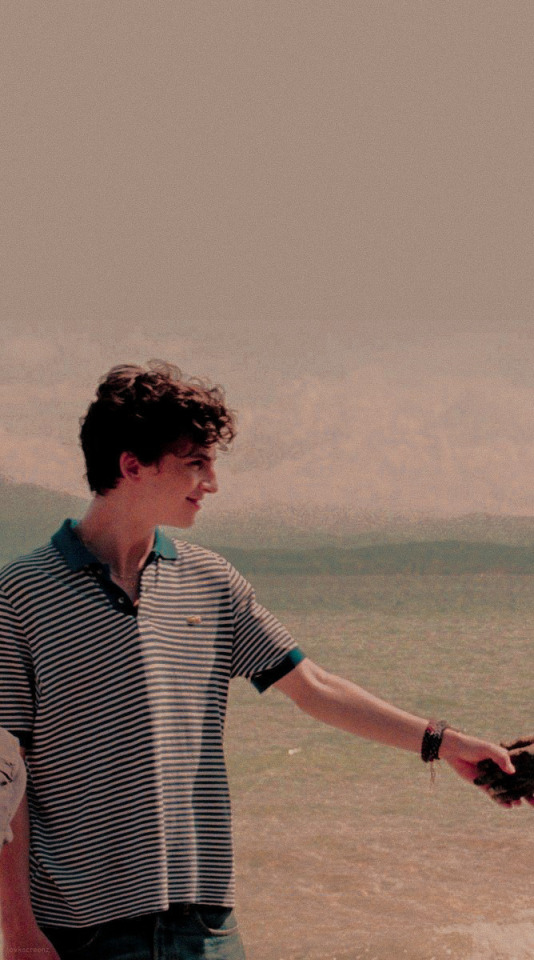
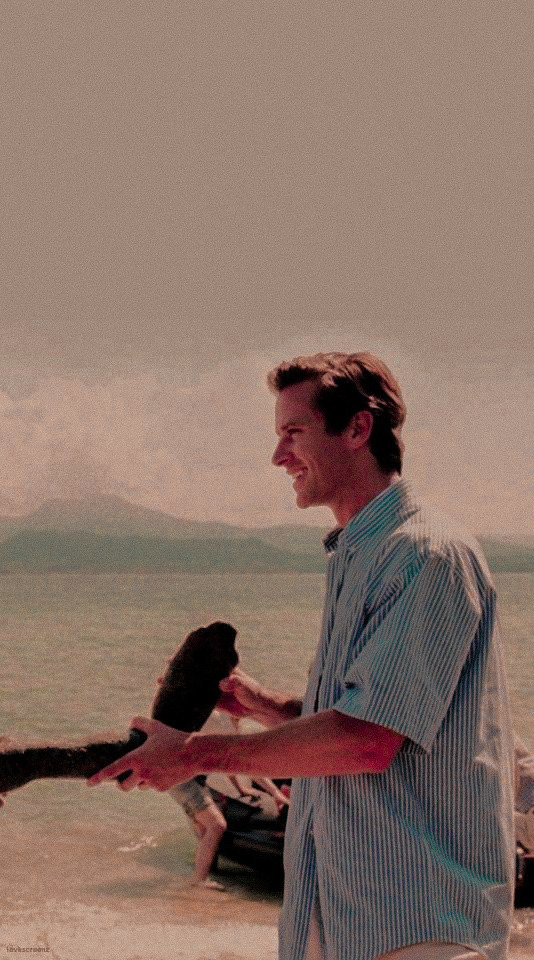
One of the most significant metaphor in this film is the greek statue. These sensual and ancient figures symbolize the nature of desire and physicality, and also represent the instinctive, irresistible love between Elio and Oliver. As an example, in the scene of cataloging the pictures of the statues, the words of Elio's father express these significance. Another scene also shows this metaphor very well. There is a scene in which the two have a little confrontation and after the subtle fight and jealousy, the camera shows the scene where they lift up the statue from the ocean. This scene can be interpreted as a metaphor that the desire became visible by bringing it above the surface as it began to be expressed as an emotion of jealousy. It means that the boundaries of emotions that were unclear until then have gradually became clearer. After the statue was brought up, the two call each other's names in a swimming scene. If there is a guideline in love, the first step will be recognizing each other's ‘existence’ (metaphysically speaking), and the last step will be taking a full look at each other's ‘existence’, the true self, a state of unity in which the other person becomes the other one, and vice versa, which is the idealistic idea of love. In that respect, it can be said that the two have already entered the stage of destined love. Following this, after making love for the first time, they call each other by their names.
In the next scene, the camera focuses on Elio sitting on a bench and reading a book, following the narration:
‘The Cosmic Fragments by Herclitus’
“The meaning of the river flowing is not that all things are changing so that we cannot encounter them twice but that some things stay the same only by changing.“
Human beings are existents that change from moment to moment, and human identity is what grows due to conflicting elements or events. One of the reasons ‘Call Me By Your Name’ is such a special movie is that it can be a movie about love but also can be a movie about growing up. In this scene, Oliver's voice specifically puts the contents of the book as a narration because probably he is the very ‘moment’, the very elicitor in Elio's life. Although it is not revealed through dialogue or narration in this film, Elio has a very important moment of choice. Before making his first love with Oliver, he continues to engage with Marzia. If we learn that some important moment will change ourselves forever, it will probably be confusing and we will try to stay in the stability that we’re standing on right now. So Elio looks forward to meet Oliver, but he also feels nervous that something might change in himself. Perhaps Oliver left the book in an attempt to share the voice of wisdom with Elio? Like a flowing river, humans will always change, and even in the moment of change, we will still be perfectly ‘ourselves’. Perhaps this is the most important narrative in growing into life.
In this film, there are many voices overlapping between scenes, which kind of reminds of the act of retracing memories through one’s mind. (When we sometimes try to remember various scenes from the past, some imagery or voices pop up first before continuing to the next scene.) Also when it is a scene that Elio's emotions are maximized, music is inserted, which can be seen as a hint that this was based on Elio's memories. And the scenes where the focus becomes blurry can also be the evidence of this assumption.
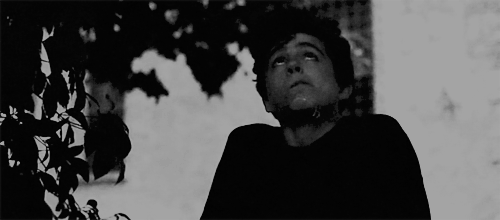
In an interview, director Luca said that the meaning of true love is to accept difference as itself. In other words, it can be said that true love is not distorting the other into an stereotyped image, but seeing the other’s true ‘self’ clearly. After the scene where Elio realizes his desire and makes a first kiss with Oliver, the camera captures the image of Elio, waiting for Oliver who is too cautious about love, who is trying so hard not to surrender. And the narration comes in the middle of this scene. 'Do I know you?' Elio asks himself if he ‘truly’ knows Oliver. Or Oliver truly knows him. Often in romance movies, looking into each other's eyes is considered a cliché. As it is said that the eye is the window to the soul, the act of looking at the eye is the final gesture of love, the gesture of wanting to understand other’s true soul (the existence, the idée-edea). This is realized when the two make love for the first time and change each other's names. What's interesting here is that it was Oliver, not Elio, who suggested this first. Even though the desire became visible, it was Elio who actively expressed it, and Oliver was the one who relatively rejected it and avoided it. Remind ourselves what Elio's father said at the very end of the movie. “Nature has cunning ways of finding our weakest spot”. Oliver, who is older and probably has some experience with love, is actually being realistic avoiding Elio. The fact that Oliver’s wound from riding a bike became more festered after the first kiss with Elio suggests that the nature has discovered such a weakness (love for Elio) from Oliver. It is also understandable that Oliver, who has completely surrendered for the fatalistic love after this, wants a full understanding of the other. He understands how love can make a person helpless and lead to despair. When people don’t try to see each other as the complete ‘true self’ or accept difference as itself, relationships between people becomes inevitably distorted and tragic. He has rejected the love for Elio because of this fear (including practical reasons), but nature brought him down to a state of exposure. Therefore, asking each other to call as each other's names can be seen that Oliver finally accepted what he refused because he was too afraid of being hurt or hurting the other, and praying only for the complete love from now on.
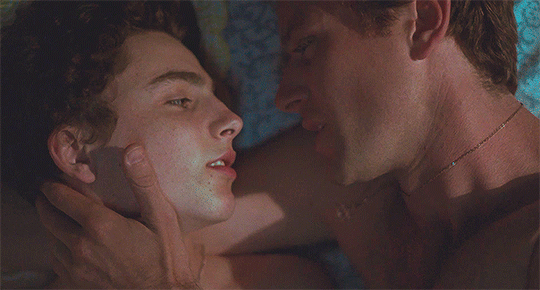
There are two related scenes that are very interesting to see in this regard. There is a scene where Oliver deliberately dances closely with another woman in front of Elio's eyes, and the next day the two confront each other. At that time, in the scene passing through the door, the person who passes through first, that is, the person who leads, is Oliver. And after the two have made love for the first time (when Oliver is completely surrendered by nature of love), in an awkward atmosphere, Elio passes through the door before Oliver. Through these two scenes, we can see that the power dianamic, or superiority in this relationship has been completely reversed.
At a square with a monument commemorating the Battle of Piave, the camera takes a brief shot ascending towards the sky. This is the scene where Elio confesses his love to Oliver without saying that he loves him. In previous work of Luca, he used movements of camera to symbolically express relationships and emotions between characters. From that point of view, perhaps it can be seen as a symbol that Elio's desire has risen to its peak, and at the same time, the change in the relationship between the two begins to drive forward. And although it may be a coincidence, the camera takes a shot from top to bottom in the scene where the two go on a trip together, before the scene where Oliver has to leave. And after a moment of the descending camera movement, there is a scene where Oliver remembers the memories of the two at Piave Square while watching Elio, who fell asleep after making love at the hotel. Then he abruptly turns to the side as the news of the sudden breakup attacks(the sound of the train). And immediately after that, the sound overlappes the scene of the train station. It is as if the journey of the two's love was brought up by fate and then settled down again.
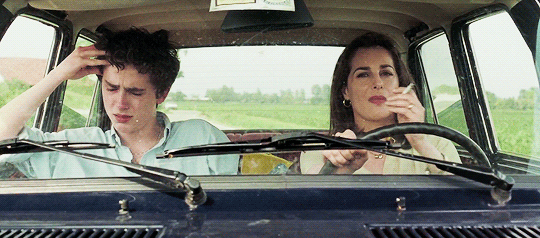
The timing of this film and the Battle of Piave are also closely related. Because the time where they are in is the summer of 1983, that is, the time of the AIDS wave. They are in a kind of virtual world that is closely connected with the reality around them, as if they were in the eyes of a typhoon. Like Elio, who confessed love while standing next to a statue that symbolizes the damages, death of the war(which can be interpreted as the AIDS situation where hundreds of people’s lives were at stake), the gap between the world in which the two are staying and the real world outside the shell is expressed very interestingly in this film.
Another interesting ‘connection’ in this movie is the scene where Elio watches Oliver dancing. There are only two scenes where Oliver dances based on the same song. Elio, enamored with jealousy in the first scene, drinks while watching Oliver, and in the second scene, this continues to Elio being drunk while watching Oliver, and after that he vomits. Personally, I think these two scenes symbolize the beginning and the end. It is the structure of continuation in the movie. Like a formal symbol where a love like drunkenness begins and ends.
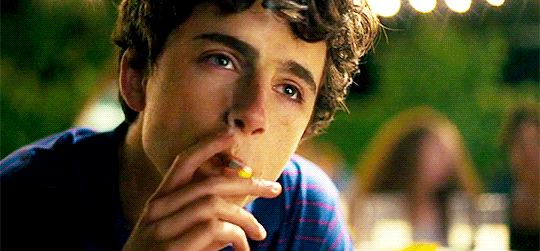
It is no coincidence that Oliver is the only American in this film, and is set in the position of a student who stays only for the summer. This is because the symbol of the stranger who suddenly appeares in the landscape where everything else perfectly melts into the background means, that the essence of love is that the differences between two world eventually make contact with each other's eyes. Even the difference ‘itself’ is accepted without any distortion. That is the purpose and theme of this film. When I watch this movie, I sometimes think that what this movie is trying to say is completely different from the other typical queer movies. Other queer movies pay attention to the “queerness” of queer, but this movie rather pays attention to the “universality”. The universality of enjoying and appreciating love is shared from all kinds of people all over the world. Despite being a queer film set in the 80s, there are no obstacles between the two protagonists. It is a choice to only show the journey of love, that magical universality. I'm a pessimetic person, so naturally I’m kind of skeptical of this so-called ‘universality’ and ‘nature of love’ that a film like this presents. Can you really accept someone with its full self without any distortion? Isn't the first thing to be addressed is the anwser to the question of ‘what is the essence of human being?’. Human senses inevitably entail distortion, and the brain, where survival instinct and the reason are mixed, attempts to shrink and simplify the multi-layered and obscure nature of humans to a minimum. Isn't the existence of others inevitably bound to collide with another? As other reviews of mine will say, I'm skeptical, but I'm not hopeless. This is because I think that the state of struggling to try is perhaps the only goal that humans should have. Maybe Director Luca have different opinions from mine, but I see this movie as part of that attempt. This fantasy, fairy tale love story looks so perfect and ideal. The director's attempt to present it as some kind of a living experience is definitely admirable.
In the last scene, when the camera calmly captures Elio's face and the ending credit goes up, the lingering emotion we feel is quite unforgettable. That scene feels ike they are finally proclaiming that this magical experience was forever over. When Elio's mother calls out towards Elio, what Elio heard was the obituary of the one united person, someone, Elio and Oliver.
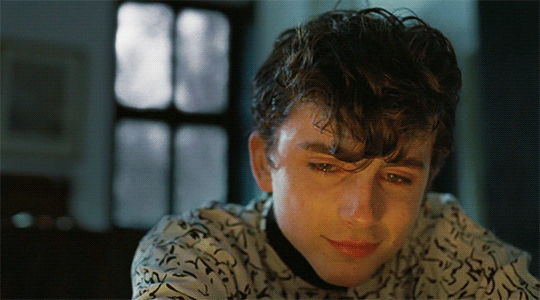
#call me by your name#cmbyn#luca guadagnino#timothee chalamet#armie hammer#film analysis#film#movies
56 notes
·
View notes
Text
Subtext and Culture, Season 2, Waiting until marriage
I was listening to the @alterlovepodcast, they’ve reached S2E7, they were talking about Noora telling William she wanted to wait with sex until marriage. And they took what Noora said at face value. No no, this is wrong, Noora is clearly making an excuse, and William is clearly not buying it! I had to go back and check my Subtext and Culture series, because surely I would have written something about this, since it’s obviously subtext, the characters are obviously not meaning what they’re saying? Ironically, I didn’t write a word about it! Because to me, because of my culture, it was so blindingly obvious that Noora was making an excuse, that it never occurred to me to explain this piece of dialogue, even though it’s almost 100% subtext. This dialogue is actually part of a subplot that spans the entire season, so this post will discuss scenes between S2E7 and S2E12. Here we go!
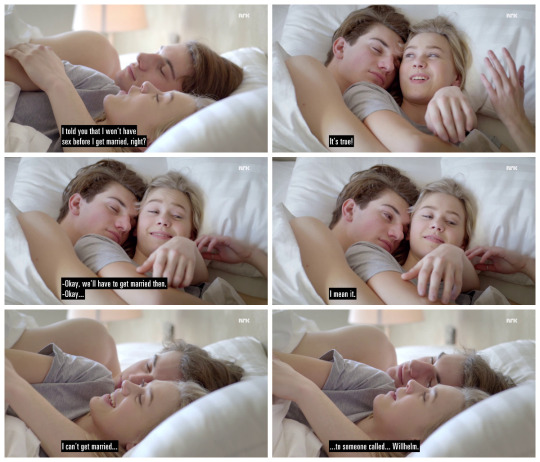
Here’s the first piece of dialogue in S2E6. William and Noora finally got together after the And Syria!-party in S2E5, and this is the morning after. and because of the season 2 hiatus, it’s been two weeks since they got together. Presumably they’ve been spending the weekend at William’s, it’s Monday morning and they just woke up, he is talking about getting naked together, and that’s when Noora says that she wants to wait until after marriage. William clearly doesn’t buy it and jokes it off, and when Noora says she’s serious he calls her bluff and agrees to get married. Since Noora doesn’t want this either, she diverts the conversation with a joke about his name. What’s actually going on in this scene is that William is asking Noora for her consent to have sex, because his expectation is that this is something you do after making out and sleeping together. Noora doesn’t want to have sex with William yet because of backstory reasons, but she’s not ready to talk about it with him yet, which is why she makes up an obviously fake excuse to not have sex with him.
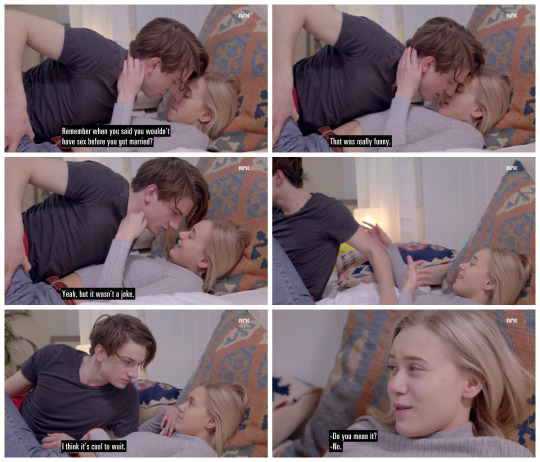
This is S2E7, and the dialogue from the previous episode is brought up again. William says it was a funny joke, but Noora sticks with her excuse, which is why William backs off completely, leaving Noora confused. William then says he wants to wait until marriage himself, and when Noora calls him out on it, he immediately contradicts himself. What’s actually going on in this scene is that William is again asking Noora for consent to have sex, because they’re making out heavily, and he wants to go further. When Noora rebuffs him again, he gets super confused because Noora is sending him some mixed signals, but he backs off completely. This in turn confuses Noora, because she doesn’t understand why he’s stopping all of a sudden. When William says that he thinks it’s cool to wait, he knows Noora is lying to him, and he is implicitly calling her out by using the same lie himself. He’s trying, in his own way, to get her to talk about why she’s lying about why she doesn’t want to have sex with him.
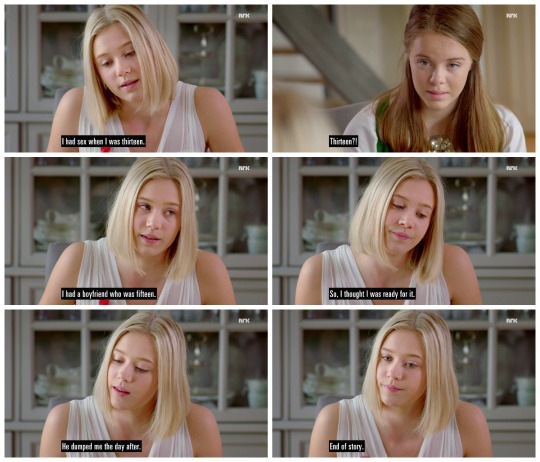
And then, in S2E10, the heavens open themselves, and the backstory is finally revealed in all its ugliness. Noora got hurt really bad in the past, and she doesn’t want to repeat that. She wants to hold off on having sex with William until she’s sure she can trust that she’s not some one-night-stand to him, some conquest that he will abandon once they’ve had sex, just like her one and only previous boyfriend did. Eva reacts with concern, because having sex at thirteen is really unusual. The average age of sexual debut in Norway is seventeen, so Noora was way too early. The story didn’t end there though, because this event was the trigger for her developing an eating disorder, and it’s very likely that this is also why she essentially fled to Madrid to get away from everyone. Given her description of her parents, it’s also very likely that she either never really told them about it, or that she did, and didn’t get the support she needed from them.
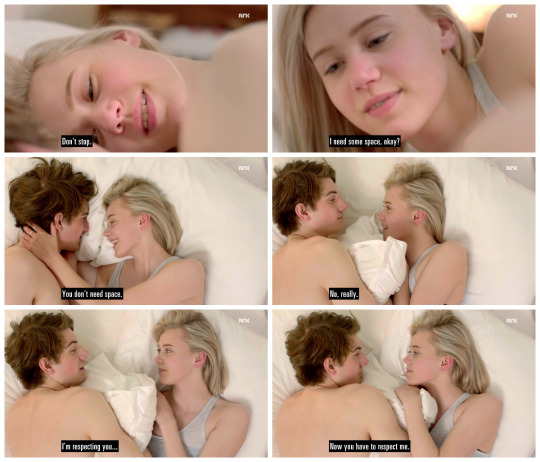
S2E12, the main plot of the season has been resolved, and our couple is again lying in bed, making out heavily. What’s actually going on in this scene is that William knows that if he asks Noora for her consent again, she’s going to say no, and repeat the same old stupid excuse. Instead, he rejects her, and when he tells her to respect him, he’s actually telling her to please trust him and please tell him what’s actually going on. And from Noora’s facial expression, we can see that she finally understands that it’s serious, and that she has to tell him.
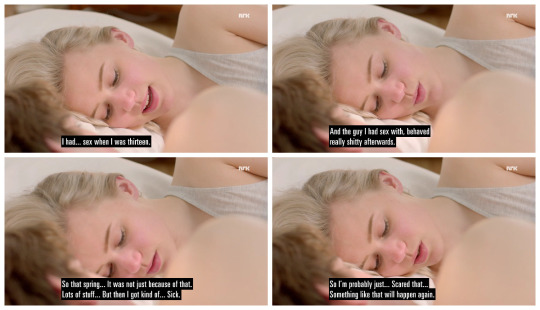
So here comes the backstory, again, and this time we get confirmation that this event contributed to her developing an eating disorder. William says he’s sorry for what Nico did to her, but he’s also meaning that he’s sorry for what Noora’s ex boyfriend did to her, and that he understands why she’s rejected him. Because finally, he got the truth out of Noora, knowing from the start that the “waiting until marriage” excuse was a lie.
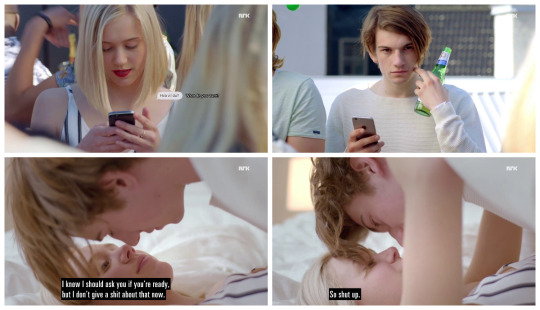
And finally, to close off this subplot within the season, Noora explicitly gives William her consent to have sex, so they do. End of story. The purpose of this subplot is to show teenagers how important consent is. Because for all the talk about what horrible fuckboys the Penetrators are, William and the rest of them actually respect consent 100%. Every single time Noora tells William to back off, he does it. And the one time William tells Noora to back off, she does so, even though the scene is played a bit for laughs with William’s boner preventing him from going to English class. The only person in the show who doesn’t respect consent is Nikolai, the villain of the season, the only irredeemably bad character in the entire series. And that shows you how important the show thinks it is, because there’s no grey area here in the show. You ask for it, you respect the answer you get, and if you don’t, you’re simply a villain.
66 notes
·
View notes
Text
FMAB: Daughter of the Dusk – Chapter 8: A Gunshot Through Hope
(A little late, but here’s my non-fic contribution to the fandom in honour of FMA day! The game is quite long overall, so this covers just the first part, which I figured people might be curious about since it ties up the cliffhanger from Prince of the Dawn. Not sure if I’ll do the rest of the game yet, but in the meantime – enjoy this chapter!)
-
Daughter of the Dusk is the sequel to Prince of the Dawn, which covers Chapters 1-7 of the story, and has a English-subbed playthrough by EnvyPlays (which you should watch first before reading on, obviously). I don’t have either game, so this summary is based on this playthrough by チキンオレ, starting from video 9 in the playlist.
The game is set before the Briggs arc, and picks up directly from where the previous one ended: at the Amestris-Aerugo peace treaty signing ceremony in Central City, with Bradley and Prince Claudio shaking hands onstage. Ed spots Scar in the audience, but he vanishes before Ed can give pursuit.
Meanwhile, up on the radio tower, Hawkeye prepares to snipe Claudio (on Bradley’s orders) with Black Hayate by her side. She takes out her pocketbook to check the ceremony map, and a photo of the team falls out, leading to this moment as she looks at the photo…
HAWKEYE: [silently] I pull this trigger of my own will. [aloud, at Hayate’s worried expression] It’s alright. [aims the rifle at Claudio as he begins his speech] The Hawk’s Eye does not miss. Goodbye, Colonel.
[sound of gunshot, cut to black]
[flashback to before the signing ceremony]
CHAPTER 8: A GUNSHOT THROUGH HOPE
NARRATOR: Central City gladly welcomed “Envoy of Peace” Prince Claudio, whose arrival marked the end of a long war. But the gunshot that rang out at the climax of the festivities – the peace treaty signing ceremony – abruptly turned the celebratory cheers to screams. The beginning can be traced back to several hours before the fated time……
FUHRER’S OFFICE: Envy leaves to bring Hawkeye to the sniper spot. Greed arrives. Bradley assigns him to bring Hawkeye’s rifle from the armoury (G: “How could a sniper forget her rifle?” B: “She couldn’t carry it and get past security.”), and gives him an ID for a weapons dealer so he can get in.
[player character: Greed]
CENTRAL COMMAND - RECEPTION: Greed bluffs his way past (G: Lying is against my creed, but I did promise to do this…), mainly because it turns out Bradley informed them beforehand of his arrival.
CENTRAL COMMAND - ARMOURY 2: Greed notices something odd about a large box, but dismisses it as his imagination, and takes the rifle. Bradley appears, having “coincidentally” passed by. Greed realises this was a test. (B: “This is a tactic that will shake the nation. Who knew if ‘the prince’ would make a racket.”) Bradley then reveals Greed’s next task – blowing up the sniper spot after the deed is done, to erase the evidence and silence Hawkeye.
[PC: Mustang, who is implied to have been hiding in the box Greed noticed]
Mustang thinks about what he overheard – the assassination and silencing of Hawkeye afterwards. (M: “My instinct was spot on, to have picked this as the meeting place! [beat] Time is running out. ……I’ll have to cancel my date. Hang in there.”) He heads out to search for the sniper spot.
CENTRAL COMMAND - LOBBY: A soldier tells Mustang that Hawkeye has gone out, and someone at the entrance might know where she was headed.
At the entrance, best boy™️ Black Hayate barks and proceeds to tug Mustang’s uniform. (M: “What’re you doing! I don’t have time to play with you now…" BH: [growls] M: “Ow ow ow! Let go! [beat] Fine, I’ll follow you! Lead me to where your master is……")
Mustang spots Envy in the city, and deduces that Hawkeye is somewhere nearby. He arrives at the train depot, followed swiftly by Ed looking for Hayate (this scene was seen from Ed’s POV in the previous game, at 13:20 of Part 18). Mustang decides to return Hayate and make Ed leave so they won’t get caught up in this. He reflects on how Hawkeye has been given nothing but tasks opposite to him ever since Claudio arrived, likely because the higher-ups wanted to separate them so he wouldn’t find out about the assassination plan… which didn’t work out, clearly. Hawkeye then arrives (their confrontation was also previously seen from Hawkeye’s POV, at 7:08 of Part 19).
[PC: Fuery]
Fuery wrings his hands over having lost sight of Mustang, Ed, and Hayate. He decides to track down Mustang since something about him had looked off, by asking around if anyone’s seen him.
ENTERTAINMENT DISTRICT: Fuery runs into Vanessa, who is Peak Angry at Mustang for passing by without noticing her at all. She says that he’d headed towards the abandoned factory.
[PC: Mustang]
ABANDONED FACTORY: Fuery finally finds Mustang, who asks what he’s doing here. (F: “Please stop saying such stand-offish things. Something happened, right, Colonel?” M: “You’re no longer under my command. Whatever I do has nothing to do with you.” F: “It does! I’m worried of my own accord!” M: “One after another… I really did get some strong-willed subordinates, huh.”) Scar then appears out of… seemingly nowhere, causing Mustang to dimiss Fuery over his protests, telling him to contact Breda and Falman. Scar and Mustang both declare they don’t have time for this. Scar activates his disintegration alchemy, but Mustang makes a smokescreen with flame alchemy and runs off.
[Time left until the fated moment – 00:59:59]
Having explained the situation to Falman, Breda, and Fuery, Mustang tells them it’s not too late to return to their posts, but of course they reject this offhand. Mustang then says that he’s going to meet Claudio and try to stop the signing ceremony somehow.
[Time left until the fated moment – 00:51:28]
Mustang asks Claudio to not appear at the ceremony, as he is being targeted. Claudio says he was prepared for the danger all along, and a mini-game follows where you have to choose dialogue that will convince him. Mustang says that it’s a plot by rebels within the military (another option says it’s by mysterious aliens, lol) with a sniper known to be a crack shot, though he claims their identity is still under investigation. Claudio then asks the real reason why he’s so determined to stop this, since it might even endanger his standing in the military, and Mustang answers that it’s out of his personal wish of peace. In the end, Claudio declares that he still won’t stop the ceremony just to protect his own life, but he will bear Mustang’s words in mind. Mustang acknowledges this determination, and says that he will do everything he can to foil the plot.
[Time left until the fated moment – 00:32:23]
[PC: Fuery]
Fuery sneaks into the communication room to eavesdrop on transmissions from Bradley’s allies to Hawkeye. After some false alarms (including a report of a woman being detained for carrying a rifle-shaped object and blunt weapon, who turns out to be Winry with automail case and spanner), he catches an exchange between Envy and Hawkeye, and finds out the sniper spot is outside the ceremony area and informs the rest. An emergency report then comes in about an intruder at the back door – it’s Scar.
[PC: Scar]
Scar barges in and destroys things while… monologuing darkly about various things, including his comrades and “that man”. (I’ll be honest, I do not like this Ishvalan terrorist subplot at all so I paid about zero attention to it.) He leaves. Falman and Breda arrive under the pretext of providing backup.
[Time left until the fated moment – 00:24:45]
[PC: Falman]
Falman and Breda head towards the watchtower to look for Hawkeye’s sniper spot. Just to be on the safe side, Falman memorises a guard assignment map of the ceremony area, which turns out useful when a suspicious soldier gives them a literal pop quiz to prove they’re really here as backup. Falman aces it, and Breda sneaks off while he proceeds to distract the soldier… with a long, long, long monologue on the founding of Amestris. Which continues even as the screen fades to black. Who ever said history wasn’t useful?
[Time left until the fated moment – 00:15:22]
[PC: Breda]
Breda sneaks up to the watchtower, and spots Hawkeye through a telescope, at her sniper spot atop the radio tower. He’s then discovered, but manages to send word to Mustang before he’s knocked out.
[Time left until the fated moment – 00:04:48]
[PC: Mustang]
Mustang hears Breda’s message but can’t get any further response from him, and rushes off. Fuery also radios in to warn that Bradley has ordered Mustang’s arrest, saying not to reply before he’s seemingly arrested too. Mustang is then surrounded, but spots a certain gremlin.
[Time left until the fated moment – 00:03:11]
[PC: Ed]
Unsurprisingly, Ed is furious, and proceeds to furiously kick ass via alchemy. Mustang warns him about the plot before leaving. (M: “The Hawk’s Eye is aiming for the stage. She’s being used by them. I don’t want to ask anything of you, but–” E: “Leave it to me.” M: “You’re not surprised? ……so you already noticed.” E: “No. I didn’t know until now.” M: [shrugs with excessive sass])
Other soldiers try to stop Ed, on account of him being Mustang’s ally, leading to an entertaining obstacle course as he dashes towards the stage. (E: “Hah, as if they could keep up with me! [beat] …wait, this isn’t the time for that!”)
We’re now back to the start, at the moment where Claudio begins his speech. From offstage, Ed spots a flash from the radio tower. He rushes forward to tackle Claudio down and gets shot……… on his automail, so it’s all fine!
It gets much less fine a moment later, when the radio tower blows up. Hawkeye pulls Hayate into a hug, trying to shield him as the tower falls onto them, but the entire thing goes up in flames just in time, metal and all. Stunned, Hawkeye turns around amidst the drifting ashes to see none other than…
MUSTANG: Sorry I kept you waiting. You ended up bearing all this alone. HAWKEYE: I chose this myself. MUSTANG: You were trying to protect us, weren’t you? Leave the rest to me. [Hawkeye inhales sharply] Protection is my job. HAWKEYE: Understood.
Meanwhile, back at the ceremony:
AL: Brother! ELENA: Brother! WINRY: Ed! AL: [silently] “Brother”!? Elena definitely said that just now……!
ED: That was close. CLAUDIO: …time to change plans. We’ll retreat for now. [leaves] ED: What was that about……?
There’s a bit more aftermath: Scar talks with another Ishvalan, Envy chews Greed out for letting Hawkeye escape (until Father bitches them out for sibling quarrels), and Bradley says he’ll release Mustang’s team.
We cut to Mustang and Breda right outside the ceremony area:
ED: Is everyone okay!? BREDA: Everyone was let off without censure. Sergeant Fuery, Officer Falman, and Lieutenant Hawkeye are fine too. MUSTANG: “In recognition of heroic actions to save the prince’s life”, apparently. ED: And what about the ceasefire treaty? MUSTANG: It’s taking everything we have just to handle the fallout. About the treaty, or the prince… none of it has been decided. ED: That prince……
AL: [narrating] The prince’s life was saved with Brother’s involvement. It seems that the Fuhrer and his allies had planned from the start to worsen the war by killing the prince. Unaware of all this, Prince Claudio remains in this country, and is said to be hoping to start over on the treaty. But there’s something I’m far more bothered by–
[flashback to Elena shouting “Brother!”]
AL: The word Elena shouted while looking at Prince Claudio… and yet, I wasn’t able to ask her anything. Because it felt like Elena would vanish somewhere, if I did ask……
To be continued.
-
And last but not least… the trailer for the next chapter!
WINRY: Oh no, it’s terrible! There’s been a case! A locked-room murder! The name of the case is “The Murder of Colonel Roy Mustang”! ED: So you died without achieving your goal… go to your sleep in peace, Colonel. ROY: Hold it right there! I’m still alive! WINRY: I’ll solve this case for sure! I definitely will! Next time, on FMAB: Daughter of the Dusk, Chapter 9 – Automail Mechanic Winry Rockbell’s Splendid Casebook! ROY: Like I said, stop progressing the story however you like! [gets elbowed(??) by Winry] WINRY: Well then, who’s the culprit!?
#fullmetal alchemist#fullmetal alchemist brotherhood#fma#fmab#fma wii#prince of the dawn#daughter of the dusk#fma daughter of dusk#what the heck IS the tag for the game#mine#fma translation#long post#i hope this is a somewhat readable format at least#it was the best i could do within limits of tumblr formatting without making it ridiculously long#ANYWAY YEAH these games do get quite ridiculous at times but i enjoyed watching em more than i expected#especially this part because mustang team shenanigans are always yes#(and also the last part of prince of dawn because riza)#also it's telling that the one line i got seriously stuck on was ed's in the next chap trailer#unsubbed audio will be the actual death of me basically
45 notes
·
View notes
Text
barriers - kj.w
jungwoo x reader feat. johnny
genre: fluff, humor
length: 2,008 words
warnings: like 2 curse words
a/n: italicized words will be dialogue in korean! also sorry if this kinda sucks lol
———————————————————————
You were irritated -- no, that’s not the word you’re looking for. You were frustrated, there it is, at this very moment. Well, actually, you’ve been pretty frustrated for the past couple of months now. All because of a stupid, adorable boy named Kim Jungwoo. There he was in the middle of the gymnasium, fooling around with puckered lips while the other members of NCT 127 try to avoid his advances on them. They were supposed to be practicing for their upcoming concert, but instead were running around chasing each other like kids on a playground. Your eyes trailed Jungwoo, chuckling as he engulfs Mark in a bear hug, the younger yelling in protest. You watched as Jungwoo’s lips smushed against Mark’s hands as Mark shoved him away, a whine leaving them in the process. His lips formed into a frown, and you felt yourself staring at them before a lumbering oaf, or so you called him, scared you shitless.
“Whatcha starin’ at?”
“Jesus Christ, Seo!” you exclaimed, clutching your chest as he pops into your line of vision. “You almost gave me a goddamn heart attack.”
He laughs and sits down on the ground next to you, stretching out his legs. He was probably exhausted from rehearsal, surprisingly opting out of being childish like the rest of his members.
Johnny was your best friend. Other than Mark and Jaehyun, he was the only one who could hold an actual intellectual conversation in English, because that’s the only language you could speak to them in.
You had met Johnny through a mutual friend. You were studying abroad in Korea and found out your roommate was interning for SM. She invited you to one of the company parties and that’s how you met him. The stupid boy whom you developed a crush on but could never talk to. If only you knew how to speak Korean, this wouldn’t be a problem. That was months ago, and to this day it’s still torturing you.
“It looks like something’s on your mind. What’s eating you?” Johnny questioned, cocking his head to the side to look at your face.
“It’s nothing,” you said, looking down at your feet.
“Hey,” Johnny said. “You know you can tell me anything, right?” You looked at him and nodded. You were about to spill it all to the boy when the choreographer called for him. “Tell me later,” he said. “Promise?” Outstretching his long pinky to you. You smiled, interlocking your pinky with his.
-
You stand outside the door to Johnny’s room, foot tapping nervously. Knocking twice, you hear loud footsteps before the door opens, revealing Johnny in his pajamas, fresh with a facemask on.
“So what’s up?”
You sit down on his bed, peering over to Haechan, Johnny’s current roommate, passed out cold. Johnny notices and shakes his head.
“Don’t worry, even if he was awake he’d be clueless.” You let out a sigh.
“So I have a… predicament.”
“Hit me.”
You look down at the floor and pray to god Johnny can keep this secret for once in his life. Last time you told him a secret of yours he “accidentally” ended up telling Haechan, who, of course, just had to tell the rest of NCT Dream.
“Okay but you have to keep this a secret, Johnny, or else I’ll murder you. I was this close to ending your life after you “accidentally” told Haechan I peed the bed laughing too hard,” you glare, pinching your fingers close together.
“You can’t muder me, you love me too much. Plus that was really funny I couldn’t not tell at least someone.”
You raise your hand threateningly at him and he just laughs and holds his hands up in defense. Sighing, you look down at your feet and let it spill past your lips.
“I like Jungwoo.”
Johnny blinks, trying to comprehend your words. He shifts in his spot, sitting up so he’s cross-legged on the bed.
“Like, like as in you enjoy his presence or like as in you have a crush on him?”
You laugh at Johnny’s obliviousness. Shaking your head, you shove him.
“You’re so dense, Seo. I have a crush on him, stupid.”
Johnny’s mouth forms into an ‘o’ shape, nodding his head as he finally understands. He peels off the mask from his face and tosses it into the waste bin under your desk.
“And you’re upset about this because?”
“I wanna talk to him, Johnny. But I can’t speak Korean, obviously, and he only speaks a little broken English. You see my predicament now?”
He slowly nods, eyes looking up and away as if he’s thinking of what to do.
“And I can’t exactly devote my time to fully study the language, as much as I would love to, I have school to focus on! I only know enough to get me around the city and to survive during my time here.”
Johnny hums before shooting off the bed and onto his feet, fists in the air.
“I’ve got it!”
“Got what?” you question.
“The answer to your problem,” he grins. You raise an eyebrow incredulously at him, not convinced.
“What genius plan have you concocted now?”
“Okay so,” he starts, sitting down on the bed and crossing his legs. “I, your best friend and the greatest and handsomest person in the world--”
“The point, Johnny.”
“Anyways….” Johnny begins. “I can act as your translator! You just tell me what to say and I’ll tell him.”
“Even if he, for some miraculous reason, liked me back, I couldn’t date him anyways. Your company would get pissed. And he wouldn’t even have time for a relationship.”
You continue to ramble on before Johnny shuts you up by placing his entire hand over your face.
“You’re such a pessimist. It won’t work out with that attitude.” You pout up at him before sighing in defeat.
“Fine.”
“Perfect!” Johnny says standing up and striding towards the door. “You have two days to come up with something to say. Good night!”
“WHAT!” you shout as Johnny closes the door. You stare at the wall, collecting your thoughts. Shit, you’re in trouble.
-
Two days stressfully go by as you try to write down all of your thoughts onto paper to say to Jungwoo.
“You absolutely cannot fuck this up,” you whisper to yourself as you wait for 127 to gather in the gymnsium again.
“You got this!” your roommate yells from her station. She sends you a thumbs up and you send her a weak smile in return. You’re shaking, and you continue to curse at yourself when you see the ink on your paper smudging form the sweat on your hands.
You watch as 127 arrives one-by-one, nervously waiting for Johnny to arrive. As soon as you see him, you wave him over. He stands over you, hands on his hips.
“Well?” You shove the piece of paper in his hands. He gives it a quick look-over before covering his mouth and laughing.
“What?” you panic. “Is it too much?”
“No, it’s cute,” he chuckles. “I didn’t know you felt this way.”
“Shut up!” you punch his arm and pout. “I’m nervous, okay?”
“That’s what I’m here for,” Johnny reassures you. You look past him to see the other members tiredly stretching, your eyes immediately landing on Jungwoo. You see him try to touch his toes, his sweatshirt bunching up around his waist, and you feel a fresh layer of sweat coat your skin.
“When are we doing this?”
“I’m going to try to get him in a better mood first,” Johnny says. “We’re all a bit tired right now.”
“Johnny, I'm about to go into cardiac arrest, don't make me wait too much longer.”
“Hey,” he says, putting his hand on your shoulder. “Just relax, this is gonna go fine.”
“How do you know that?” you question, but Johnny just gives you a smirk and runs off to join the other members before you can pry an answer out of him.
Crouching down, you keep your eyes glued to the ground, counting down the seconds before you have to face your crush.
-
You’re almost dozing off by the time you hear footsteps approaching. Blinking and looking up, you’re met with two giant men standing over you, one being your best friend and the other being the person you like. It’s almost comical, the speed to which you get onto your feet.
“Hi,” you gulp, trying to make eye contact with Jungwoo. You hope your face isn’t as red as it feels.
“Hi!” Jungwoo replies cheerfully and you want to curl up into a ball and roll away far from where you are.
“Y/n has something she wants you to read,” Johnny says. “Isn’t that right?” He looks directly at you, eyeing the paper in your hands.
“Oh!” you fluster, realizing what he means. “Yes.” You shove the piece of paper out towards Jungwoo, who looks taken aback. He takes it and looks at it before looking at Johnny, unsure of what to do.
“What is this?” Jungwoo questions.
“Just listen,” Johnny responds.
You watch nervously as Jungwoo’s and Johnny’s eyes read over the paper. Johnny begins to read aloud.
“I don’t really know how to begin this so I’ll just get straight to the point. I like you. But not in a fan like type of way. I mean in an ‘I want to be there for you all the time when you go through hardships and hold you when you cry. The person you go to when you need comfort. The person you stay up with watching dramas with until 2 in the morning. The person who gets to hug you everyday and calls you theirs.’”
You watch Jungwoo’s facial expressions while Johnny’s reading. His eyes are wide and you can’t tell if he’s shocked or panicking. You definitely are panicking.
“‘I understand if you don’t feel the same way because we’ve never really talked other than casual interactions but I just needed to let you know because I’ve been thinking too much about it lately and it’s causing me great amounts of stress keeping it to myself.’”
By the time Johnny finishes reading, Jungwoo’s face is beet red. You can’t tell if it’s a good or bad reaction and your insides feel like applesauce.
“Now it’s Jungwoo’s turn,” Johnny says with a big grin.
“W-What?” you question, looking at Johnny, your eyes saucers.
“Just listen. Go ahead.” He nods to Jungwoo and you watch as Jungwoo pulls a paper out of his pants pocket. Johnny clears his throat and reads.
“We’ve never really talked formally but I wanted to ask if you wanted to get food with me sometime and watch a movie together in the dorms? I think you’re very pretty and want to spend more time with you. I don’t have the guts to tell you this myself and my english isn’t that great so I’m having Johnny read this to you.”
You think your soul has left your body. He likes you back? Has Johnny been keeping this from you??
“So I’ll leave you two to it!” Johnny says before dashing off to the others.
You stare at the floor in full disbelief. You don’t know where to look. After about 10 seconds of silence you muster up the ounce of courage in your body and look at Jungwoo. He mirrors your stance, eyes avoiding yours. Once you look at him though, he offers a small smile at you.
“So...?” He says shyly. “Do you...?
You blink at him before realizing what he’s asking you.
“Oh! Yes!” Jungwoo gives you a toothy grin.
“Good!” he says before someone calls his name. You give him a shy wave as he runs back to join the rest of the group.
“So, how’d it go?” your roommate asks you as you plop down next to her. You hide your face in your hands, trying to contain the squeal that was threatening to erupt from you.
“Better than I could've ever imagined.”
#nct#nct 127#nct u#nct dream#jungwoo#kim jungwoo#nct jungwoo#nct 127 jungwoo#jungwoo fanfic#jungwoo fic#jungwoo fluff#jungwoo scenarios#jungwoo soft hours#jungwoo timestamp#jungwoo imagines#jungwoo imagine#jungwoo x reader#nct fic#nct fics#nct fanfic#nct fanfiction#nct fluff#nct 127 fanfic#nct imagines#nct imagine#nct soft hours#jungwoo blurbs#nct blurbs#nct blurb#kpop
104 notes
·
View notes
Text
Mugen’s Autonomy: Personal Feelings or Obligation For Fuu
I recently received this ask: “Something always gets in the way of me being fully behind Fuugen. Ever since, Mugens always highly valued his own autonomy. He does the complete opposite of what he's told, and he constantly repeats that he doesn't work for anybody but himself. Even his partnership with the Yakuza didn't last long, and his condition for his last pirate job was that it was supposed to be one job only. He's such a free spirit I don't see Mugen being able to settle down with anybody. Do u think Mugen x Fuu can last?”
So I thought I would write another of my annoying Fuugen posts about it, since responding to asks means cutting down the response. Here is my full answer!
You bring up a valuable point and uncertainty. However, I do have some evidence to refute this, that I hope can clear your doubts or maybe change your opinion.
Autonomy or Moral Obligation?
You are 100% right that Mugen values his own autonomy. This is a major part of his character that we have seen in the early episodes, all the way until episode 17. Though, saying he is purely autonomous complicates Mugen’s intentions.
Let’s say Mugen only takes the orders that just so happen to align with what he wants. Then that means that every decision he has made in the anime...was because he wanted to make them. That means he saved Fuu so many times not merely out of obligation of her orders, but because he cared deeply for her and desired to do so on his own.
At the beginning, yes, it would seem he selfishly does everything for himself. But he is also not purely acting on obligation and morality, which he does have, despite not showing it. His autonomous feelings are a mix, just like absolutely everything about him: he’s a “chanpuru.”
He stuck with her, and saved her when he didn’t have to, for his own personal feelings, as well as because he ended up caring and sympathizing with Fuu enough to want to help her.
The Times Mugen Obeyed Fuu’s Orders
You mentioned that he does the complete opposite of what he is told. But this is not fully true. Mugen does take orders. On many occasions, Mugen swallowed his pride and took Fuu’s orders time and time again. He also took one other order...from Jin. I’ll get to that later.
Two examples were given of Mugen not doing what he’s told.
The first you mentioned is that Mugen’s job with the yakuza did not last. This was because he didn’t believe in their shoddy morals or ways of thinking. They exploited the weak and used roundabout ways of getting what they wanted, rather than fighting directly. In the very same episode (episode 4), Mugen leaves the yakuza for good. BUT, while walking in the rain, he remembers Fuu behind the bars of a brothel, yelling at him “What are you doing?! What about your promise?!” He swears, and runs back to the brothel to rescue her. He didn’t have to. She gave him an order he didn’t need to follow. But he went back anyway, for no other reason besides either his own personal moral feelings to save her, or his obligation to the promise he made to her.
Either way, it’s about Fuu.
The second mention you made was how Mugen’s gig with Mukuro and Koza’s pirate band did not last in episodes 13 and 14. However, Mugen hated Mukuro for his cruelty and methods, and the way he used Mugen’s past sins to manipulate him. Mukuro got under his skin, making him feel he is trapped in his sinful past. There is some very revealing dialogue here. When Mukuro asks why Mugen is traveling with Jin and Fuu, Mugen says he is protecting them (Fuu) until they get to Nagasaki. Mukuro laughs at this, turns to Fuu, and says “Do you have any idea what kinds of things he’s done? Or how many people he’s killed? That’s hilarious! A guy like you protecting people?” Mugen then looks super angry and puts a sword to his neck.
The yakuza and the pirates were both immoral, and he had no intention to stay with them...because he wanted to continue his journey with Fuu. In the case of the pirates, he claimed he worked for them to get them money to get to Nagasaki.
Fuu’s need for Mugen’s help had pure intentions. She foiled Koza greatly in that way. When Koza asks Mugen to run away with her, he responds “I’m not that type of guy.” and knocks her off him. But, in the next episode...he grabs Fuu’s wrist and continues to travel with her. When Koza cried for Mugen, it was a ruse to get Jin to kill her brother Mukuro, so she could run away with Shige, with all the gold. When Fuu cried, she meant it, and nursed him back to health.
Here are some other incidences of Mugen taking orders from Fuu.
The most major to me is Episode 20. Here, Fuu chooses Jin to leave with Sara instead of Mugen, leaving her and Mugen to travel all the way to Nagasaki...ALONE TOGETHER. Mugen was 100% ready to do just that, despite his and Jin’s planned duel. Though he complains, he shuts his mouth quickly. Mugen then only seemed annoyed when Fuu started crying over Jin leaving. But he stomped ahead of her, and was ready to take her all the way alone! He could’ve left at any time. But he didn’t, because by episode 17...her goal became his goal too.
In episode 16, Fuu and Mugen got into a big argument, and they split ways, leaving Jin to sigh and leave last. It is interesting to me that in episode 17, Okuru tells Mugen his story of how his mother and child were killed...and at that moment he metaphorically died. Okuru also got revenge on some of the Matsumae samurai who caused their deaths. At the end of that very same episode, Mugen (Not Jin!) asks Fuu why she wants to find the sunflower samurai, and asks her if it’s revenge. When she responds, “Yes, for my mother.”, that is the turning point for Mugen.
Even jokingly, Mugen is constantly being “tamed” by her. This is a behavior she rarely ever exhibited with Jin.
Here are ways he takes her orders. She physically covers Mugen’s mouth in episode 10, in the Buddhist temple when he gets angry. She pulls him by the collar and drags him along for beating up people in episode 7. And later in episode 7, she tells him not to hurt Shinsuke, even though he wanted to beat the kid up for pickpocketing him, and also holding Fuu hostage. She yells at him twice in episode 20 about Sara, to not sleep in Sara’s room, and later to get out of the bath when he was with Sara. Those are just a few examples of things Mugen let her command him about.
And of course, Mugen and Jin don’t have their final duel until the very end, after she found her sunflower samurai: a repeated command of hers.
Fuu’s Fear of Mugen Leaving +The Final Order Mugen is Given
In episode 24, Fuu confides in Jin. Though it’s very hard to decipher the meaning of this conversation, it is clear to me that Fuu was telling Jin that she believes Mugen will not want to stay with her (or will lose their planned duel). Jin however, seems to be offering to stay with her after the journey ends, in the event Mugen leaves (or dies).
Jin: “What will you do after you find the sunflower samurai?”
Fuu: “I really haven’t given that much thought.”
JIn: “If I should-”
Fuu: “I don’t really want to think about stuff like this. Because that jerk Mugen-”
Fuu: *tears up* “I’m sorry. I’m so sorry.”
The English dub and subtitles further complicate this cryptic conversation. But based on the line “Datte, Mugen no aitsu ga-” it’s debated what Fuu will say. Was she going to say “Datte, Mugen no aitsu ga suki desu.”? “Because I love Mugen.” ?
“Because Mugen wouldn’t stick around like you would.”?
“Because Mugen will die.”?
We don’t know.
Whatever she intended to say, it was about Mugen. And mentioning Mugen was a reason for her to apologize to Jin, and hug him. It is here Jin puts a hand on her shoulder, as a form of comfort.
Now...here is the most important order Mugen ever took. This time, it’s not Fuu’s order. It’s Jin’s. When Kariya asks Mugen and Jin, who both want to fight him, who will leave and who will stay, Jin has a flashback of that riverbank scene with Fuu. And then this dialogue happens:
Jin: “Go.”
Mugen: “No, you go!”
Jin: “Fuu is depending on you.” or “Take care of Fuu.”
And then the wind starts blowing symbolically. This scene is so very important to show Mugen’s growth. Earlier, we see that Mugen was secretly watching Fuu hug Jin on the riverbank the previous night, though I doubt he could really hear or understand their conversation. To me, it seems he assumed that Fuu cared for Jin more, as her and Mugen never shared such an intimate thing as a hug.
Despite initially telling Jin no, he soon realizes what he must do, and then runs to go save her.
Based on him having that flashback, Jin knows Fuu wants Mugen to save her or show he cares by coming back. He even smiles when Mugen leaves.
This fear of Mugen not truly caring about her is echoed in episode 25, where Fuu tells Umanousuke: “You’re wasting your time. Mugen hacks away without giving the hostage a second thought.”
(This is so stupid to me because Mugen saved her so many times alone in nearly every episode she was kidnapped/held hostage and Jin never did so without Mugen until episode 26...Grr. it would appear she thought this, only because she thought he’d leave the moment his debt was paid.)
Mugen then shows up, catching her by surprise. She doubted him, but he came back for her.
Mugen then tells Fuu: “I won’t die.” And then...
“Ore wa shinjirou”. “Believe in me.” or “Trust me.”
When Mugen had thrown away his sword to save Fuu, he cares more about her living and meeting her father than his own safety. He was brutally tortured and could have easily died multiple times.
This again questions Mugen’s autonomy.
Did Mugen save Fuu merely because Jin told him to? Or did he save Fuu because he wanted to? I think it’s both. Mugen took an order to protect Fuu...and went to save her because he obviously cares about her.
My Opinion On Their Parting Ways
Personally, I believe that as much as Mugen needed to swallow his pride and show he cared by saving her, Fuu also needed to stop clinging to her bodyguards for help. This is a major reason why I think having them part ways was so important! She finally let them go, to choose their own path without feeling merely obligated.
To me, it seems the characters are testing fate. In episode 3, Mugen states “Fate keeps throwing us back together.” but in episode 16, he gets mad at Fuu when she asks “Why have you stayed with me all this time?” and responds with “It was pure chance.” It appears they don’t know why they kept meeting up. Maybe it was merely the promise that bound them.
If they were to meet again now, without pure chance, or circumstance, or an obligation, or a promise, it would mean fate really did bring them back together. And once they met again, they would not part. That is at least, my interpretation of the ending.
They did not say “Sayonara.” which is an official farewell, but rather “Jaa ne.” “Mata o.” and “Jaa ne. Mata itsuka.” These are all more informal, implying the characters hope to meet again.
Do I think Mugen x Fuu can last? Why:
You also asked if Mugen and Fuu would last in a relationship.
I believe that for something more to develop after the series between them, Mugen needs to stop running off and pretending he doesn’t care. And Fuu needs to let him go and accept his free spirit… Both of them already showed they were capable of doing this.
So, my answer is 100% yes, I believe they could last.
This is because of the sacrifices Mugen and Fuu already made for each other. Not only did Mugen throw his sword—his life— to save Fuu, Fuu also threw her own life in the way to save him from Sara. Not only did Mugen go back to save her many times despite acting like he didn't care and didn't want to, Fuu also let Mugen go, despite subtly confiding that she wanted Mugen to stay.
Now if you’re asking in a traditional sense, such as marriage, or tying him down, no I don’t think this is how Mugen and Fuu would end up or last. And that is why I do not support Mugen x Yatsuha: the kunoichi who wanted to marry him (The existence of her partner Hankichi’s jealousy, and her occupation are other reasons why I don’t ship it).
My belief in them not traditionally settling down isn’t even just because of Mugen. Fuu too has no one else besides Mugen and Jin. No family. No other friends. A wedding in Tokugawa era Japan is more of a bond between families. But Fuu has no parents to give her away with a wedding dowry, just as Mugen has nothing to give but his physical protection of her. They’re not that different, really. They’re both poor. Both stubborn. Both like to eat a lot. Both constantly argued.
But I can see Mugen and Fuu meeting again...and going on another adventure together, free of the excuse of obligation or a promise. I like the idea of cosmic symmetry and also of fate bringing them together. Mugen and Fuu met first, with him saving her in Episode 1, before Jin even entered the picture. Perhaps they’d travel together for a long time, experiencing everything they want to. Fuu herself stated multiple times that she did not want their journey to end in Episode 20. And Mugen also is a wandering spirit.
From there, maybe one day they could have a family, whether they travel with a child or do inevitably live in one place when they grow old.
How Mugen’s Values Changed
I think Mugen mindlessly traveling forever only to eventually die by the sword ruins his development. Because, after all, even big bad old Mugen had viewpoints that changed by the end of the series. He was not at all a static character. I would say he matured the most.
Mugen desired to kill any opponent stronger than him that he couldn't defeat. But three separate times, this doesn’t happen. He was nearly killed by Sara, had Fuu not saved him and then was spared by Sara twice. Then, he left Jin with Kariya Kagetoki, an opponent he couldn’t defeat, because saving Fuu was more important. And most importantly, Mugen and Jin did not kill each other. He stated in episode 26, that he didn’t feel like it anymore, despite always wanting to kill people he couldn’t defeat.
By the ending of the anime, Mugen is less of a lawless uncaring ex-criminal, and more of an ideal bodyguard like are so often seen in morally focused samurai chanbara films. Mugen embodies the spirit of samurai—morality, honor and obligation—just as much as Jin does, despite not being of samurai heritage, or even Japanese!
I also see Mugen’s relationship with Fuu as a redemption arc. In both scenes where Mugen is dying in episode 14 and then episode 26, he is followed by the Paantu figures in black. These are figures from Ryukyuan Miyako folklore that ward off evil and bad energy. For them to take Mugen to the afterlife, seems as if they are destroying an evil spirit. But Fuu calls him back to life three times in the final scene, redeeming him. He still has a reason to live. She gets no similar scene with Jin.
Instead of aimlessly wandering for people to kill who were stronger than him, Mugen found more of a meaning out of life. Purpose. And companionship.
I believe that it is no coincidence that the track that starts when Mugen tells Fuu to run in Episode 25 is titled “Your Purpose”, with the singular lyric of “You.”
I hope that the evidence I have provided from the episodes can help clear up some doubts about Mugen x Fuu. If it doesn’t, well, I hope that it can at least help you and others to see Mugen as a dynamic character who does in fact take orders...but only orders from or about Fuu. In terms of autonomy, he had come back to Fuu and stayed with Fuu all on his own in many incidences.
68 notes
·
View notes
Text
Brick Club 1.3.9 “Joyful End Of Joy”
This title is such a weird choice. This time it’s not a translation thing, but a Hugo thing. He decides not to focus on Fantine’s reaction to the surprise, but on the other girls’ reactions. It’s weird, but I think it also works, because it serves to highlight how unusual Fantine’s reaction really is. The rest of the girls shake off the abandonment pretty quickly, because none of them made the same attachments as Fantine. Her devastation is highlighted by their mirth.
The men keep up the pretense long enough to even turn and wave at the women, laughing. I get the impression they’re giggling at their prank, but the girls probably think they’re just being jaunty. Also, I wish I had a better visual of the area. I imagine them kind of blending in with the crowd, maybe turning a corner or something out of sight, and then heading to wait for the stagecoach.
Again, Hugo shows the difference between Fantine and the others. While Fantine repeats herself with “Don’t be long,” the other grisettes are more preoccupied with what the surprise might be. Also, so far Fantine’s really only had two lines, since one was about the horse, and the next two lines are nearly identical to each other.
“You’d think piles of chains were flying off into the heavens.” I love the visual of this line so much. There are so many visuals in this book that I wish I had the skill to draw. This line’s an interesting one. My first instinct is to say that the metaphor feels backwards? “Piles of chains flying off into the heavens” sounds to me like saying these men that could have held these women down are leaving. But that seems backward. Unless perhaps that’s the opinion of the other grisettes aside from Fantine? My other thought is that maybe it’s not really a good thing or a backward metaphor. These chains which are the men are flying off, but the next ones could be even worse, could leave the rest of them in the type of situation that Fantine is now left in. These specific chains have flown off into the heavens, but that doesn’t mean there aren’t more waiting in the wings.
The fact that Fantine gets the most important, foreshadowing line is interesting to me because it’s a very specific observation. “That’s strange,” she said. “I thought the stagecoaches never stopped.” The group has just spent the last 8 chapters mocking Fantine’s head-in-the-clouds state of being and how she doesn’t notice anything. And yet she notices this little detail and points out that the stagecoaches don’t usually stop. (I like this from the headcanon that she’s autistic, too. Social cues etc are harder to pick up on, but a change in a weird little detail like when the stagecoaches stop is something she notices because it’s wrong but no one else notices or cares.)
Favourite then insults Fantine and says she knows nothing of life and essentially calls her a simpleton while making fun of her observation. What is Favourite’s problem? She’s really the only one aside from Tholomyes who gets actual dialogue mocking Fantine. God, this whole group is so awful. The next line is “Some time passed this way.” I can’t tell if Hugo is saying that some time passed where they were just staring out the window, or if he’s saying some time passed where they were making fun of Fantine. Either way, this constant picking on Fantine is so cruel, from all of them. Especially Favourite and Tholomyes. It seems like Favourite is in the best situation out of all of them, too: she’s the eldest, has her own home, and is cheating on Blacheville with Tholomyes. Maybe she’s guilty and that’s why she’s so aggressive towards Fantine; she’s trying to convince herself there’s a reason she’s doing this thing with Tholomyes. I don’t know.
It seems like Fantine has never really had stable friendships in her life. These girls have been having affairs with the students for two years. It might be the longest Fantine has every really had a friendly, familiar, consistent relationship with other grisettes outside of work. And it seems like the other grisettes, particularly Favourite, really take advantage of that naivety to mock her.
Why is Favourite the only one so preoccupied with the surprise? She was the one to ask for it properly, to announce it the morning of and get everyone up early, to keep reminding everyone of it, and now to read the letter. Nobody else seems to be as obsessed with the surprise as her. No one else has dialogue mentioning it. She’s like the “leader” of this little group, so it stands to reason that she’s Tholomyes’ counterpart and that would make her be the one who thinks about the surprise kind of in tandem with the fact that Tholomyes is the one orchestrating it. But I still think it’s odd that nobody else seems to care as much as she does. It almost sounds like an insecurity, a point of anxiety for her? Everyone but Fantine seems to be expecting Gifts. I actually wonder now if this is why they are unsurprised by the letter being a parting one. What they think is going to happen is that they are going to get parting gifts; instead they get this letter and a paid for meal. It’s a letdown, but the leaving is expected, I think.
Before I get into the letter, I just want to point out how weirdly classical the line “they desire our return and offer to kill the fatted calf for us” is. The rest of the letter just sounds like a regular letter, but that line in particular sounds like I’m reading Homer or something.
The men start off their letter explicitly pointing out the class differences between the themselves and the grisettes. Despite the fact that Favourite’s mother lives with her, the men obviously don’t see that as similar to their own, rich parents. Hugo says earlier that Fantine is, essentially, a child of France. The students seem to see all of the women in that way, as crude orphans who have been taken in and socialized by Paris. The men then contradict themselves, quoting their parents as calling them “prodigal sons” and then in the next sentence calling themselves “virtuous.”
I can’t find anything on the Bossuet line; I assume it’s a pun that I don’t know enough French and/or Bossuet literature to understand. “Fleeing to the arms of Laffitte,” I assume, means running back to high society, back to rich families and political connections and all that stuff. They’re no longer slumming in Paris with working girls, they’re going back to the safety of the society of banking and politics and all that. I don’t know what the “wings of Caillard” is referencing, because the only Caillard I can find is Gaspar Caillard, whose writings aren’t translated into English.
The gall of them to straight up call the girls “the abyss,” man I hate these men. They see these women as a fun little jaunt into lower society. These women, who are without family (or the same kind of family as these men), who are very poor and probably teetering on the edge of penniless, are the closest these students can get to this “abyss.” I bet they think they did some sort of fucking charity, too, and treated these girls to a “good time” for two years or something before dropping them. Ugh.
“It is necessary to our country that we become, like everybody else, prefects, fathers of families, country policemen, and councilors of state.” Reading this line just makes me feel so disgusted. That men like this, who are slimy and manipulative and selfish and uncaring like this, are the ones who are going to become people in charge of the infrastructure of their local society and who will have power over people in similar positions to these grisettes. It reminds me of Bamatabois, who not only was able to harass Fantine and then get her nearly thrown in prison, but was also a juror at Chapmathieu’s trial. Twice he has the power to decide someone’s freedom; I imagine these law students will have similar positions in their own respective towns. It’s also such a gross flaunting of their social position, telling these women that they have all these opportunities and connections and money to become whatever they want, and these women are left in barely-paying labor positions on the edge of total poverty.
(This is also a really important piece of characterization, I think. It contrasts massively with the students we see later on, who come from rich families (minus Bahorel, I suppose) but who are dedicated to the betterment of others.)
Something I don’t quite understand is the paying for dinner thing? Why? Is it just because they knew maybe the girls wouldn’t be able to afford it? Why do that one niceness with such a cruel prank? Was it like a last “look at us, we can afford one last lavish meal before we vanish” sort of thing?
Favourite is so odd to me. She decides that if this prank was Blacheville’s idea, it makes her fall in love with him. She says “No sooner loved than left,” which makes me think it’s a sort of “you don’t want it until it’s gone” type of thing. But I’m also wondering if it’s a comment on potential cleverness. She only likes him more now that she thinks he’s clever enough and cunning enough to come up with and pull off a joke like this one.
Then the realization that it was actually Tholomyes comes. None of them seem surprised (neither are we). They laugh about it and I assume that, again, the “Vive Tholomyes” is a celebration of his cleverness at this elaborate joke. But they seemed to know that the end was coming, so it’s just a funny and interesting ending to them, rather than a boring goodbye. Also, I wonder if they would have been more upset if the dinner had not been paid for.
I don’t have much to say about that last visual of Fantine crying in her rooms, except for fuck Tholomyes. Also, what a damn bombshell for Hugo to drop on us, spending all that time describing Fantine and then in the last sentence revealing a child.
9 notes
·
View notes
Text
Gochiusa BLOOM episode 3 impressions
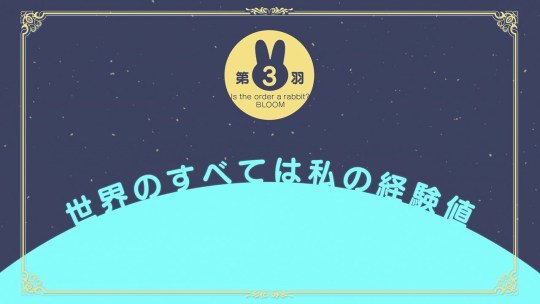
Previously: episode 2, episode 1 (seriously, the number of notes on ep 2 review is too low...)
Welcome to another review of Gochuumon wa usagi desu ka? BLOOM. In this episode, the series explores a topic it rarely touched previously, which is school life. Unlike many similar slice-of-life series, Gochiusa rarely concerned itself with such a mundane setting, preferring the ambience of cafés and cobblestone streets. There were a few exceptions, such as the first half of season 2 episode 10, but this is the first episode fully dedicated to a school setting.
Another distinguishing trait of Gochiusa is that the group of main characters attends not one, but several different schools. In particular, there are two high schools: a “normal” one attended by Cocoa and Chiya, and an “elite” one attended by Sharo and Rize. Moreover, there’s a group of middle school characters on the verge of graduating. As such, the question of which high school will Chino, Maya and Megu eventually choose was bound to come to the forefront at some point. And that’s exactly what happens in this episode.
There’s a lot of interesting stuff to discuss, so let’s get down to business...
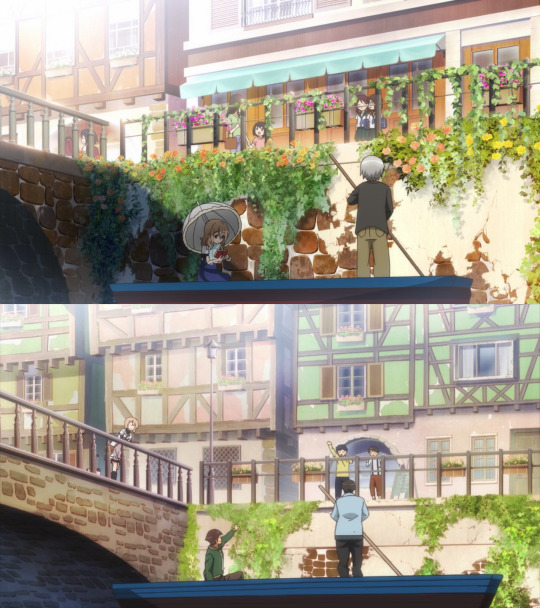
The episode opens with a shot of Aoyama Blue Mountain on a boat, which also appears in the beginning of season 1 episode 1. By the way before COVID you could totally ride a boat like this in Colmar. Just watch your head...
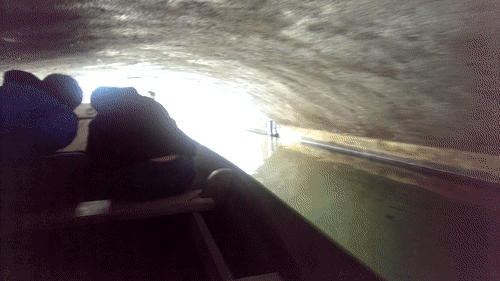
Yeah, this is under the bridge from season 2 ED. Filmed by me.
Anyway, I’m being sidetracked. What’s important is that this is the only shot where you could tell it’s morning, because of the angle of the shadow from the bridge. It is indeed morning, and we see Cocoa and Chino walking down to school. Seems the summer vacation is over and it’s already September? Cocoa, the self-described pikka-pika no onee-chan, tries to coerce Chino into committing to enter the same high school as her, while Chino is not sure about that. We’ve seen Chino being unsure about her future as recently as this season’s episode 1, and in regards to the high school choice the time for a decision is quickly approaching.
Soon we see Maya and Megu who are facing the same decision. Megu seems to have already decided on what Maya derisively calls the gokigenyo school. The greeting gokigenyo (ご機嫌よう) comes from the word “kigen” (機嫌) which means “mood”, and can be literally translated as “how do you do”. However the same word is also used as farewell, which often causes troubles for translators.
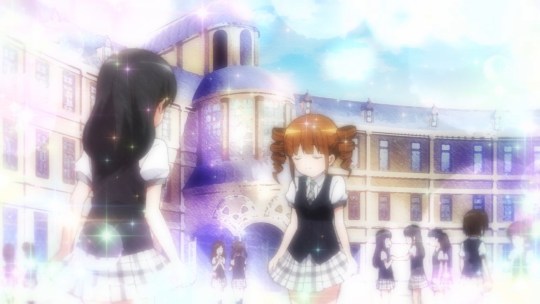
The concept of “gokigenyo school“ has been popularised by the light novel and anime series Maria watches over us (Marimite), which is also one of the most influential works of the yuri genre. This concept has also been parodied a number of times, for example in the excellent episode 5 of Flip Flappers.
Megu manages to convince Maya and Chino to come with her to a tour of this school, and we get a close-up of Maya hinting that she’s definitely hiding something.
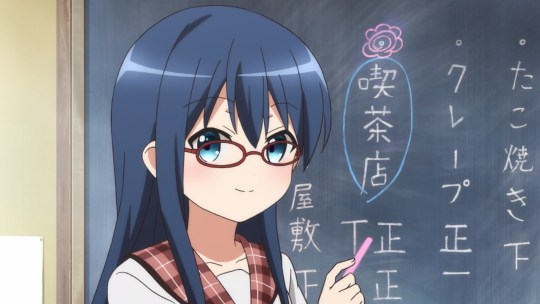
Meanwhile at Cocoa’s school, the class president declares the theme of the cultural festival being “cafe”, and puts Chiya and Cocoa in charge of it, because they work at a cafe. It seems that Chiya is considered to be more dependable than Cocoa by her classmates, since she got a higher rank. Nevertheless, it is Cocoa who mostly delivers the speech to fire up the other students.
Note the usage of Chinese tally marks to tally the votes. The five strokes comprising the character 正 (”truth”) equate 5 votes. This method is popular across East Asia, even in Korea where Chinese characters are no longer used.

Also I’ve seen a lot of people were confused by the inclusion of “sex museum” as one of the proposals, which is how 秘宝館 (hihokan) has been translated by the official subtitles. This word, which literally means “the hall of hidden treasures” has been used by various establishments of this type in post-war Japan, however only few of them remain open now. I think “sex museum” is a bad translation because, while technically correct, it breaks mimesis, or in simpler terms, immersion. The English translation is so blatantly inappropriate that it would never make it onto this blackboard, whereas the Japanese word is obscure and innocent-looking enough that it just might. A better translation would be “adult museum”, in fact that’s what the most well-known hihokan, Atami Hihokan uses for its English title.
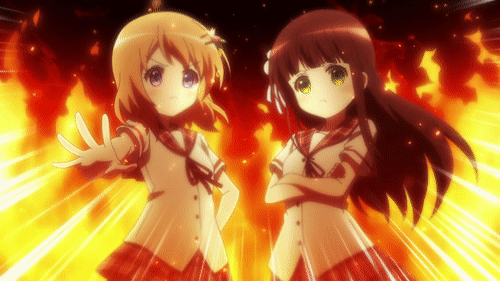
As proof of each other’s ability, Cocoa mentions Chiya’s triple tray wielding skill (お盆三刀流 obon santoryu) which has been demonstrated in season 2 episode 1. Chiya brings up Cocoa’s “basking in the sun” (日向ぼっこ hinatabokko) attitude which supposedly makes her popular among customers. This is a reference to season 2 episode 5 where Rize says Cocoa always either practices latte art or basks in the sun.
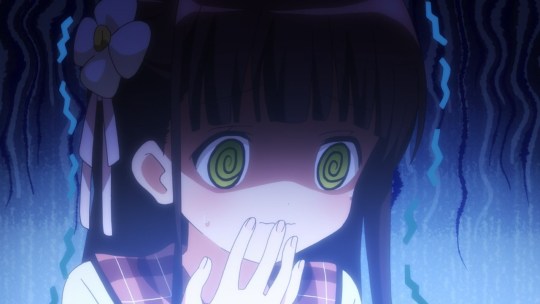
On the way back from school, we learn that Chiya is actually scared of the responsibilities placed on her, and her dream of becoming the president of Ama Usa An franchise (which has been mentioned in s2e1, s2e9 and maybe other episodes I forgot) might be ruined because of this. Cocoa consoles her, again showing her motherly side.
Back at Rabbit House, Cocoa explains how the upcoming festival will be exciting (wakuwaku) and fluffy/cuddly (mofumofu). This is one of several times Cocoa uses silly onomatopoeia to describe something in this episode (aforementioned pikkapika onee-chan and describing her school also as mofumofu in a latter scene). Interestingly, all of these lines are anime-original, and at this point seems like an intentional effort to make Cocoa speak in a more eccentric manner.
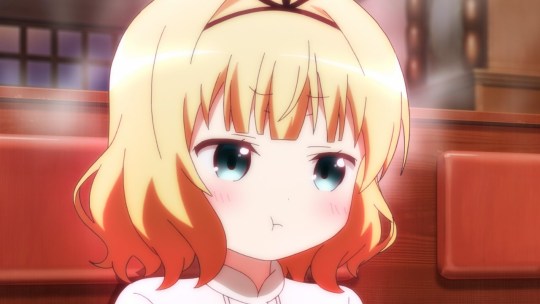
In the next scene Sharo becomes angry at Chiya for keeping secrets from her, and blows her cheeks, which makes her turn into a Fugu fish, according to Chiya. Fugu is famous in Japanese cuisine for being a highly poisonous but sought after delicacy, however in this case the comparison has to do with the tendency of a live fugu (as well as other pufferfish) to inflate its stomach, giving it an almost spherical appearance to deter predators.
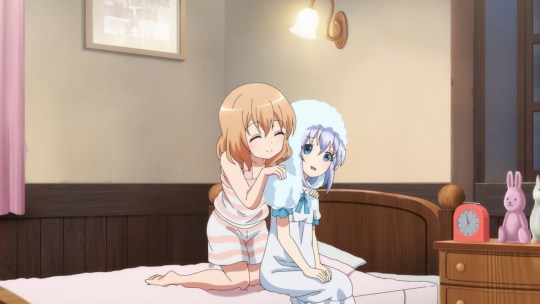
Next there’s another anime-original CocoChino scene where Chino asks Cocoa about what her school is like. This is my favorite part of the episode because it’s just so adorable. Like, even the fact that Cocoa is drying Chino’s hair with a towel after bath shows how close they became. The direction and the delivery of the dialogue is masterfully executed. Cocoa would be really hurt if Chino chooses any other school, and Chino knows that. But Chino can’t admit she’ll choose her next school because of Cocoa, at least not yet.
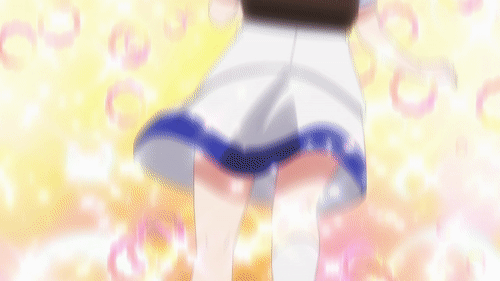
Now we move on to the main plot of the episode, which is Chimame visiting Rize and Sharo’s school. Like I said in the preview, this episode covers chapters 10 and 11 of the volume 5 of the manga, which in-universe occur at the same time. However while it fully covers (and has the same title as) chapter 10, only the first half of chapter 11 is included. So about 2/3 of the episode are dedicated to the story of chapter 10.
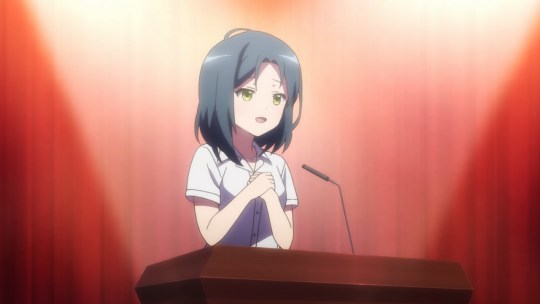
Chimame attend a speech by “OG” Mate Rin. OG in this case doesn’t mean “original gangsta”, but “old girl”, which is a Japanese term for female alumni of some school (there’s also OB for men). Chino recognizes Rin as the editor of Aoyama Blue Mountain, and I’m not sure if Maya and Megu ever met her, so they don’t. When Rin recalls a senior who turned her life around, Chino recalls her chance meeting with Cocoa. In particular the phrase deai ga taisetsu (”chance meetings are to be cherished”) sticks with her. On the other hand, Maya seems to be interested in the fact that Rin was recommended for scholarship. Interestingly in the manga, Maya slept through most of the speech.
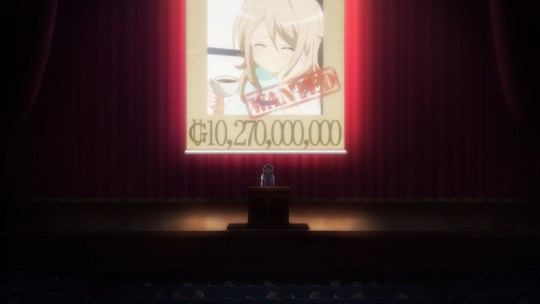
The senior Rin was talking about was obviously Aoyama and we see that there’s actually a huge bounty placed on her. The currency sign consisting of combined letters G and U wasn’t seen before, with prices usually displayed in yen, but there was a Euro-like sign at an open market at the beginning of season 2 episode 1, which might be a shorthand way to write GU. Either way this currency must have a serious hyperinflation problem as the reward for finding Aoyama exceeds 10 billion GU. In countries affected by hyperinflation, a stable foreign currency is often used to perform economic transactions, which might explain why most of the prices are in yen.
But is there some significance to this exact number? Why, yes, 10/27 is Aoyama’s birthday! It is also the start of “reading week”, which actually lasts 2 weeks, until November 9.
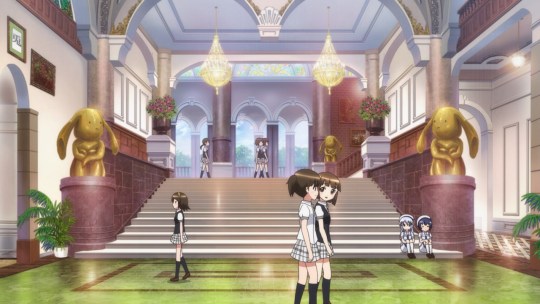
After the speech Megu gets separated from the rest of the group, and the other two also get lost in the vast campus of the school. As seen from the above interior shot of the school, it is also inexplicably rabbit-themed (or maybe just this particular hall is), with golden rabbit statues and also a picture on the left wall with the kanji for rabbit (兎).
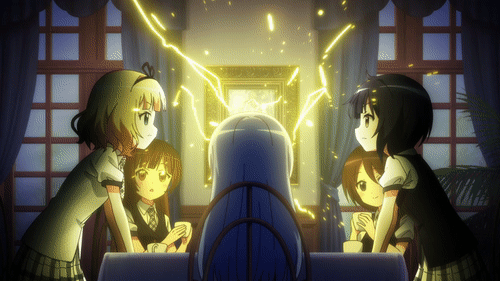
Through a series of misunderstandings Chimame end up infiltrating the school with Sharo and Rize providing uniforms for them to blend in. Despite having trouble to behave “ladylike” before, Maya naturally blends in once she treats it as a game, and even gets invited to a tea party. She makes a mistake though by mentioning moyashi (bean sprouts) which is considered a cheap and low-class food, but she’s saved by the fact that the rich girls don’t even know what that is, and Sharo explaining how to prepare it in a fancy way.
Eventually the groups meet each other and Maya reveals she has been recommended for scholarship due to her good grades. Perhaps she also treated her school grades as experience points to gain, as the title of the episode (and the manga chapter) ”The whole world is my experience points” seems to suggest. This is the idea behind a real concept of gamification, by the way.
There’s also a callback to the season 2 episode 8, where Maya asks Rize for advice while Chino and Megu are spying on her. It is worth to rewatch that scene, because it’s full of foreshadowing for this episode. Back then Maya thinks she’s the only one of the three to go to this school, but now she thinks there’s a good chance all three will still go to the same school. Chino doesn’t seem to feel this way though.
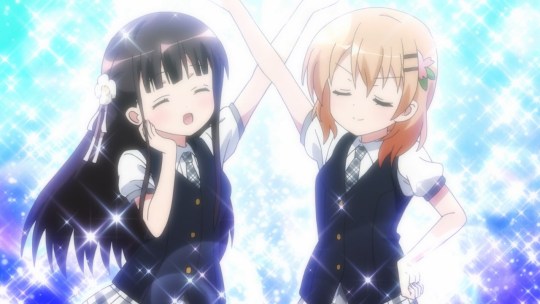
In the end we see Cocoa and Chiya joining the group, also wearing the elite school uniforms, which is briefly explained by them gathering supplies for the cultural festival. I guess the next episode will explain how they ended up there. In the manga even the fact that they have a cultural festival wasn’t revealed until this point. Also in the manga fukiya club president, Karede Yura, inexplicably appears for just one panel so that Cocoa and Chiya could thank her, without any lines. In the anime she appears just as (if not more) suddenly, however there’s some foreshadowing with her inviting Rize to a tournament earlier, and she gets quite a few speaking lines.
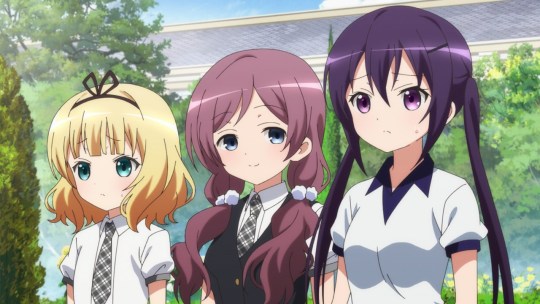
If you listen closely there’s a funny sound effect as she looks at Rize, and then at Sharo. I really liked her design since her first appearance in the manga, and Koi probably does too, as her role has greatly increased in the recent chapters. Consequently her single-panel background appearance has been expanded as well in this episode, she got her full name mentioned in the credits, and there’s even a Karede Yura character song included on the second BD volume (which includes this season’s episodes 3 and 4). All things considered, I fully expect Yura to appear in the episode 4 as well.
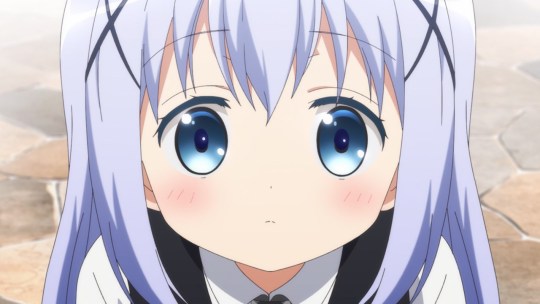
The episode ends with Chino looking at the sky with a worried expression. It just hit her that both Megu and Maya are going to a different school than she is expected to go to. As Megu and Maya have a clear path forward, Chino’s future has become even more uncertain, and she feels like the odd one out in the group. Now the part of the ending where Chino is suddenly alone makes sense:
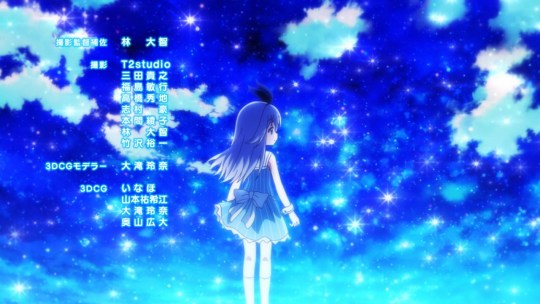
this is basically her imagining the future where Maya and Megu leave her. The coffee cup transition symbolises Chino waking up and seeing that MaMe are still her friends and aren’t going anywhere. We’ll see though...
This time it’s Megu doing latte art in the ending, and the picture is of Chino and Maya dancing. The weird thing is, Megu wasn’t even present at this scene, so how did she draw it in such detail?
Also another random fact I noticed: Chino’s Alice costume actually appeared in the opening of both season 1 and season 2. Here’s a comparison for reference:
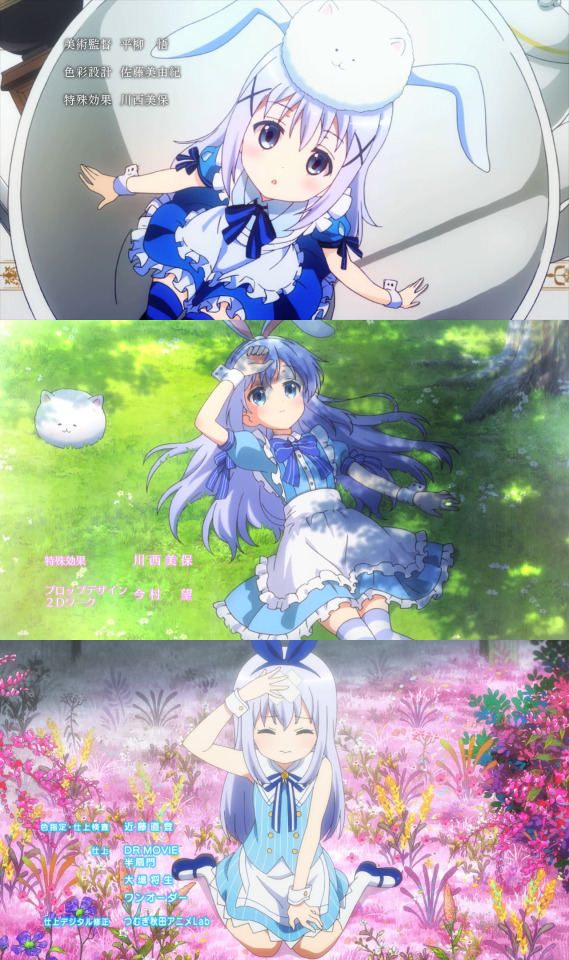
Anyway, that was the third episode of Gochuumon wa usagi desu ka? BLOOM and I hope you enjoyed reading my review. See you next week... or so.
10 notes
·
View notes
Text
333: Pride, Gluttony, & Scars
Warning: This a very long post that contains character analysis and an as-of-yet unsubstantiated theory. I don’t blame you if you want to skim read, and there’s a TL;DR at the bottom.
I’ve seen a lot of posts about the events of the newest chapter of Nanatsu no Taizai; as someone who does manga edits, I spend quite a bit of time staring at panels and dialogue to figure out how to organize, what can be taken out, what should be left in, etc. And I’ve done the same with this chapter, pouring over the scenes of Escanor’s final moments again, and again, and I’ve seen a theory about Merlin posted by @derieri, so I’d like to share my thoughts on the final words exchanged between Escanor and Merlin.
But first, let’s talk about blame. I’ve seen so much of it going around: Elizabeth should have healed him, Mael should have kept Sunshine, Meliodas should have kept him from fighting, and while those are valid complaints, they also subtract from and undermine Escanor’s character and the development of his arc. We learned from his gaiden that he thought he was a monster, unfit to live, a beast to be put down without remorse. It wasn’t until Meliodas bested him in combat and forced him to realize that his life was not his to do away with so carelessly that he began to live. And Escanor did what so many people with chronic depression/suicidal tendencies do: he latched onto his comrades as a reason to continue living.
Note: I am someone who suffers from the above conditions, so I am basing my analysis on that.
To Escanor, his very reason for being alive in his world was to protect the people he cared for, even if that meant losing his life in the process. And while he does care for the people of Liones — seen by him battling Estarossa to keep them safe and purposefully moving their fight to a lake to avoid hurting the knights nearby — the largest part of his world was the group of misfits who had become his friends. The Seven Deadly Sins were his family, the people he loved, the ones he would do absolutely anything for. Escanor did not see value in himself outside of as a tool to protect others; even without Sunshine, facing down an Indura spawn, he was willing to let it rip him to shreds to protect Gilthunder and the others. He was willing to die then. If Mael hadn’t intervened, he would have.
The long and short of what I’m saying is that, even without Sunshine, he would have found some way to put himself in that battle. We knew he was dying. It was shown in the blood he continued to cough up no matter how many times he was healed, in his disregard for his safety while fighting the Sinner at Camelot. His one regret when he thought he was going to die then was that he wouldn’t be able to continue protecting his comrades. Escanor, in his final moments, made two choices that those around him, who loved him, respected: he retook Sunshine to fight for his friends, and he burned up his life to keep them safe. (For those of you saying that Mael could have taken his place: yes. Or he could have joined in. But the Sins weren’t able to resist the Demon King without Merlin’s limit break magic, so whether or not him doing anything would have changed the outcome is debatable.)
Now that the bulk of my understanding of Escanor’s character is done, let’s move on to what originally prompted this post: his confession, and Merlin’s reaction to it.
While saying his farewell to the Sins and others, Escanor makes sure to acknowledge each of them in some way, whether by thanking them, apologizing, or asking for a favor. Or, in Ban’s case, getting in one final roast. What doesn’t he do? Downplay their grief. He fully acknowledges that his death is going to impact them all in some way, particularly not being able to attend King and Diane’s wedding. And when he gets to Merlin, he makes the confession of feelings she already knew he held.
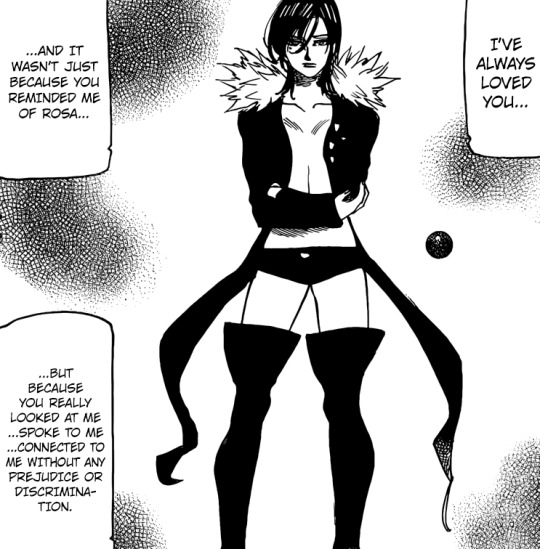
After which Merlin does what Merlin is best at: she deflects. This is a canonical character trait for her; whether making a vague mention of something (her love for Meliodas), or waiting until the last second to reveal pertinent information (her Infinity magic), Merlin is known to be powerful and mysterious. She’s cool, she’s unruffled. And that doesn’t change here.

What does change is how Escanor speaks to her. Up to this point, he has always been respectful, almost to the point of absurdity. He does not press her on anything, does not question her. Yet here we see him blatantly refuse to allow her to hide behind a half-truth. Did Merlin view him as a test subject? Yes. Merlin views everyone that way to some degree. But Escanor isn’t a fool, and he immediately shakes his head and tells her that his feelings for her exist regardless of her view of him. Which leads to this:

Her veneer cracks. Merlin has only appeared vulnerable to this degree at one other point, and that was the death of Arthur. Her cool demeanor falls apart whenever some she cares for is dying, and that’s what happens here. If you want to read her body language, she’s averting her gaze (hiding from him), crossing her arms (to get distance/hold her emotions in check), and digging her fingers into her coat (to retain control). The moment Escanor tells her that he doesn’t care how she sees him because it won’t change how he feels, she begins to fall apart. And what does she say? “You’re too late.” We’ll come back to that.

She continues by seemingly veering off topic. “Too late for anything, for everything . . . some things just can’t be taken back.” Now, quite obviously we have yet to get a full gaiden for Merlin. Some of her backstory has been hinted at, like the destruction of Belialuin, which seem to be what she’s referencing here. But there’s something odd about it, and as @derieri pointed out, the way she’s wording her sentences and the confusion of Meliodas and Elizabeth make it highly likely that she’s referring to something other than Belialuin’s fall while saying that it’s too late. She continues by saying, “Escanor, I wish you would have found me sooner . . . If possible, 3,000 years sooner . . .”
That’s a very specific time frame, given that the first Holy War ended exactly 3,000 years before this event with the sealing of the Demon and Goddess Clans and the curse put on Meliodas and Elizabeth.

Here, Escanor directly acknowledges that there is something other than the sin that earned her the title of Gluttony. Merlin’s reaction?

Utter surprise and, by the sweat on her brow, horror. Whatever this sin is, it’s something that she’s tried desperately to keep hidden for centuries. Not even Meliodas, who she once loved, or Elizabeth, who she views as an older sister, know what it could be. When Escanor says that he doesn’t know the specifics, only that there was something else because she always looked so sad, we get a close up of her eye. Traditonally, this is a technique used whenever one character breaks through to another. It’s meant to bring us close to the character, to show those boundaries breaking down.
In this context, it means the boundaries between Merlin and Escanor are breaking down.
She goes silent after this while he says his final farewells, and doesn’t move until she goes to him and kisses him. There are three things that happen in those few panels that contradict Merlin’s established character: 1.) she moves towards someone, instead of having someone move to her; 2.) she acts on an impulse; and 3.) she puts herself directly in harm’s way. Merlin has been in battles before, yes, and she has suffered damage, but it is very rare for her to put herself so blatantly in danger when she doesn’t need to be. She could have told him she’d always remember him fondly. She didn’t need to burn her face as horribly, yet she did.
Directly after the kiss, she says:

There’s an interesting word choice here that might not be obvious to non-native English speakers. Merlin does not say, “I do not reciprocate your feelings for me.” She says, “I was never able to reciprocate your feelings for me.” In other words, she doesn’t say she does not love Escanor. She says she’s unable to love him. And there’s a world of difference between those two. It’s the difference between saying you do not eat something because you don’t like it, and you aren’t able to eat something because there’s a reason, like an allergy. Something is prohibiting Merlin from returning his feelings, at least in a deep way.

This is the panel that first caught my attention. “As proof of your life, as proof that you existed, I’ll take these burns upon my body . . .” That is a lot of commitment for someone she claims to see only as a research subject. There’s another person we’ve seen sear their flesh to touch the person they care for, and that was 3,000 years ago, when Meliodas reached into a goddess barrier to cradle and comfort Elizabeth. Merlin is scarring herself so that no one, herself included, will ever forget Escanor. And furthermore, she’s doing it as a symbol of his love for her.
Remember that point I said we’d come back to later? In the theory, it’s stated that Merlin sold Meliodas and Elizabeth out to the Demon King and Supreme Deity. Which, frankly, I think would be another level to the tragically beautiful story that is Nanatsu no Taizai, but from that come two possibilities: Merlin was punished for her hubris in daring to speak to the gods she betrayed by having her ability to love removed, or she removed it herself after the destruction of her home/the curse being placed.
Tl;dr: Merlin did, in some way, love Escanor, but whether through her own means or outside interference was unable to reciprocate it fully.
#text#long post#nnt#nanatsu no taizai#merlin#escanor#escalin#nnt meta#nnt analysis#meta post#analysis post#it's been a while since i did one of these and it came out waaaay longer than i expected#and it's also four am so i'm rambling a bit as well
124 notes
·
View notes
Text
Writer Notes: The Wicked + the Divine 44
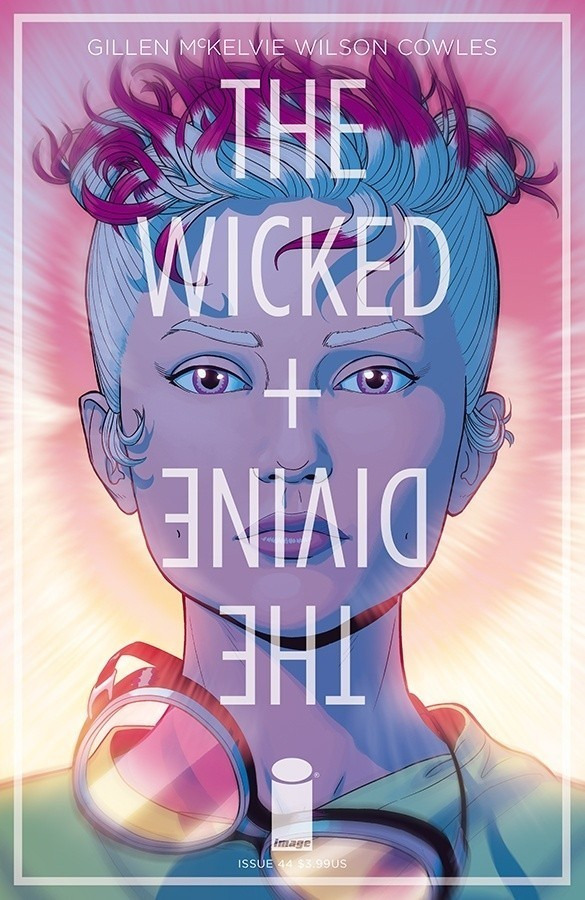
Spoilers, obv.
I'm aware that this is either going to be a relatively short one or an epic one. The risk of the latter is that rather than just talking about the issue, for the first time I'm free to talk about the series as a whole, and so talk about some of those other choices. There'll be some of that, but it would warp the nature of the notes, and give some false perspective. I can talk about it being over now, sure, but talking about it all means I'm not talking about this element. Not least because I can't talk about it all – there's still the question of issue 45.
But still. There's a lot to talk about, and a lot of hard things in here to do. We knew where we going, but the devil is in the details. The devil's everywhere.
Jamie/Matt's Cover
Minerva finally gets her head-shot. I was a little worried that people would realise exactly what was happening to Minerva here, but I didn't see anyone realise she's falling, and speculate why. Of course, I knew what it was and couldn't not see it. That's how it works.
It's a striking last image though – this is an especially blank glance, in the middle of all the motion. Matt's pink/white nimbus is really powerful too.
Emma Rios/Miquel Muerto
Emma's one of our favourite artists, and we were so glad that we managed to get her before the end. Emma's always someone who gets this evocative drama of it all – this is obviously a momentous cover, but you don't know the moment until reading. Laura and Lucifer being a core relationship, and the hint of leaving. Miquel does strong, atmospheric things with the colours as well. It's a great cover to end the story on. On - Pretty Deadly is back on the same day as 45, and I can't wait. Gets!
IFC
In terms of minor things we did which have a big emotional effect, changing the gods' names to their human names was certainly one. It sits there and stings.
Page 1
This issue is particularly tightly wound, so we set the clock on the issue in this one page.
I had a couple of people wonder where the cops came from. I presume it's because the delay in publication – the "we have to go now because of woden's tape has revealed we're almost all complicit" is the only reason why they went for Minerva immediately.
For a page that's so tightly wound, Jamie does some great establishing here. Opening panel with the fire in top of Valhalla, to link to last issue. A shot with all these people in it – a character beat, and three extremely dialogue low panels.
Page 2
Riff on Better The Devil You Know.
The weird rhythm in WicDiv is the arcs-which-take-place-in-a-very-short-time and arcs-which-take-place-over-months. Faust act, Rising Action, Imperial Phase II, "Okay" are the over-a-short time. Fandemonium, Commercial Suicide, Imperial Phase I and Mothering Invention are the extended ones. The closest to one which does both is Faust Act, which spreads its action over a week or two.
Page 3
Lovely stuff in here with Jamie, in terms of character work – obviously this is Lucifer hamming it up, but seeing individual responses around the room is a hell of a thing. Minerva's a total mess here.
Valentine giving up clever insults at this point is probably a thing.
Page 4-5 "Bothersome" is a very Lucifer word. The expression in panel 2 is also key Lucifer – that eye-roll of it.
Laura's captions also arrive mid way through – key, as they're clearly going to be key. I was thinking of having them at the start of page 3 as well, but we can let us live in the moment.
Laura's performance tentacles is a lovely panel – seeing how Matt works the colours on the space. The blues fading to white, the reds. Honestly, this is making me miss working with Matt already, and seeing how good he and Jamie are together.
Callbacks here to Lucifer in the first arc – the cycle of it all.
"There were two girls in hell" makes me well up. |It's one of my favourite Jamie expressions in the issue.
Page 6-7
When planning the larger structure of WicDiv, I was aware that I made certain calls in hope I would be able to save people. The early "death" of the Heads was actually a way to protect them. I was aware that characters who were in play were far more likely to die, as they had more chances to do so. I knew I could likely save the heads, so by making them heads, I made it more likely.
I originally planned for Dionysus to die, but I couldn't bear it. His hubris was real, but the idea that someone could give so much without anyone really caring or doing something for him was too heart breaking, even for me. I realised during Rising Action that I could actually save him – the pieces were already in play, and I just had to lean into those relationships to lead to Baph's choices. At the start, I wasn't sure where Baphomet ended in year 4 – part of me thought he'd survive, as I didn't have that final beat for him at the start. That I didn't have a hard end for Baphomet always made him open to the story finding another purpose for him – which is an end which I can't imagine any other way now. WicDiv is an awful necessary machine.
That applied to Lucifer too. She was a darling, obviously, but she was always going to be trouble. Part of me was aware that she could come back and almost immediately get killed again. I'd like her to make it out, but it was possible she wouldn't.
So, as I said last time, when I realised she was the final opposition I was pleased – that was perfect to the themes and the structure.
I wrote in my synopsis that Laura uses a performance to touch Lucifer and convince her into renouncing her godhood, and left it at that.
There it sat until I came to script it.
Because, in all honesty, I had no idea how Laura was going to convince Lucifer to give up her godhood. I just trusted that there would be some way Laura could reach her. Or, really, I hoped there was – because I knew if I wrote something that didn't feel convincing to me, I wouldn't do the scene. Lucifer would have died instead.
So, the day came when I was scripting this sequence, and I started writing, and wondered what the performance would be, and I just wrote "Laura descends the Ananke head sequence and drags Luci back."
Then I leaned back, a little shocked, because that was clearly right, and so clearly fit with what the series does – a final deconstruction of one of our core visual icons, giving a new way to look at the sequence and think about it. It was just there. As if it was there all along. Or just the sort of thought that emerges when you've been obsessed over this fucking thing for five years.
I'm aware of the weird resonance as well – Laura's finding a performance to save a friend is me finding a performance to save a character. WicDiv was a weird book.
Jamie and Matt go to town, of course – the melting faces are just painful, and wonderfully done. The fleshy reds, the fires. How Clayton uses the captions across the page to play with pacing...
I originally suggested we do it completely as the WicDiv spread, with Laura crawling across the centre spread and making her way up – that it would be treating what is meant to be two columns as a space was decided to be too much, so instead we went with flipping to a subjective perspective on a space that we've only experienced from a single objective outside viewpoint. That's got magic too.
Page 8
A long time to get to this kiss, right?
We moved the dialogue around a little to nail some moments – we had the magic effect on the final panel so the transition to the next page wasn't too much.
The annoyance of Eleanor in the last panel is just my everything. I described it to Jamie by using a metaphor of me in my early thirties, having split up with an Ex, and torn between various places, including seriously wondering whether, after everything, the simple answer to my sexuality stuff was that I was just gay. How annoyed I would have been, after all those years, if it was that. Just a "Oh, FFS. I'm just gay! Why didn't I get that earlier? Why have I wasted all this time? What a fucking fool I am."
That.
Page 9
Repeat of core WicDivian imagery, turned to a different purpose. After these magificent godly reveals, we do this very normal world.
Yeah. This would have been a happy place to end the series.
Page 10
Laura wants to be better, of course. It's easy to say you want to do better.
A+ Cassandra-ing in the background there.
Page 11
Now, Minerva is dead in a few pages time, and she is a genuine monster, trapped in a system of her own making. But I didn't want to send her into the void thinking she had that horror awaiting her. I can't forgive her, but I can give her a little peace.
Title drop, of course, with a wonderful expression by Jamie. There's a lot here.
Okay, let's do this.
"Okay" is a phrase that's haunted WicDiv. We've come back to it multiple times – it's a fascinating word in the English language, and has caused problems for people translating it, in the mixture of ambivalence and optimism in it is really tricky. Clearly, we use everything inside the word.
It wasn't my Dad's last words, but it's the last exchange I remember with him. Everyone else was out, and I was helping him back to his seat. He says to me.
"Son, I know this is strange, but I can't help but think it's going to be okay."
And I can almost imagine my eyes bulging out of my head, as I wanted to howl at him: no, Dad. It really fucking isn't.
This comes up almost verbatim in the first arc, with the exchange between Laura and Lucifer before she breaks out. The series is about many things, but my Father's death was the core inspiration for it, and that "It's going to be okay" haunted me and it.
I don't think this is what my Dad meant, clearly, but it's how I've ended up metabolising it. I've been signing "It's going to be okay" when I sign Faust Acts, partially as it's the WicDiv phrase, partially as a secret-promise-that-they-won't-all-die-and-there-is-hope and partially because "When death comes, it's okay" is that buried in it. If I had to boil the book down to a sentence, it'd be it. It means different things depending how you look at it. That's all I've got.
Page 12
I talk about Solving The Equation of the third year, and Dio being in play for this section is absolutely part of it.
That first panel. I said that the cast were all people I'd have killed to be at various stages of my life. Umar is someone I try to be now. I don't succeed, but he's a worthy goal. Kind is not soft and all that.
While the silent panel is something you've all seen before, it's worth highlighting how good Jamie is. The favourite gesture of the scene is the eyes upwards of Cassandra – I don’t remember Jamie using this angle before, and it's really striking. I suddenly miss that I won't be working with Jamie again for a while. Have fun, Jamie. You were the best.
And now, this.
Page 13-14-15
"It would take a real monster to kill a kid" is one of those lines that have been sitting in the files since the beginning.
There was a fan artist in the WicDiv community early on who kept on doing these totally charming portraits of Baal and Minerva playing around in a big brother and little sister way. Every time I saw them, I felt both love for the art, and a sadness. "In four years time, you are going to have a terrible day."
That's one of the weirdest things of the last four years – that. Knowing that stuff is out there.
Looking at this at a little distance, I see the elements in – the standing on the edge, the "Please Don't" and all that. I sigh. This is awful and upsetting and that page turn is one of the hardest in the series. I wish Valentine would forgive himself, but he couldn't.
This is the sort of thing I want to write a lot about, and want to write nothing. I think I'll keep it as just the facts, in terms of trying to plot this.
Occasionally you get to a knot – I knew Valentine had to kill Minerva, that Valentine couldn't bear to live after that was done and that Minerva had to die after Baal gave up his powers. How to you put those three together, without introducing something else.
C asked "Where does it happen? Could it happen somewhere high?" and the rest was there. Falling being the repeating WicDiv image as well.
I think I pictures this actually side on, without the drop. Jamie's choice is better, just because of the eyes.
The three panels is something we're returned too, but choosing the distance was key. You know it's there, but I didn't want to revel in the dead bodies. This is a different kind of death to many of the ones in the book, and has to be treated as such. Any more blood than shows they're dead would be obscene.
I sigh again. I note that Matt does the lights on the guns perfectly, but I want to highlight craft. The shot of eveyrone waiting is a huge thing – Inanna's grief, Dio stepping in, and the crossed arms of Cassandra...
16
I think it was when I was plotting the second year at WicDiv that I realised that I couldn't see a way out of this which didn't involve the majority of the cast ending up in jail for a while. I was okay with that, as it made some sense. It's thematically resonant for a few ways – it's a choice which shows their acceptance of their acts, and their actual humanity as well as an understanding of their power, and lots more.
However, due to all the straight, white characters being dead, it does mean that a all-queer all-PoC-minus-Lucifer cast going to jail, in the current jail system. That said, while far from perfect, the UK is not the US. I don't think I could have written this ending in the US. Even in the UK, I safety-proof it conceptually as much as I can.
They are all queer, and almost all PoC... but they are also superhumans (and mostly rich.) They have a degree of power, and options which are not open to other people... and it is their one chance to try and navigate this space with no-one else (either them or other humans) getting killed. It's their last chance to act in good faith to the rest of the species.
I wouldn't trust the system if they were people without their resources. They're not. And this is the least-worst choice I can see.
I'm sure some of you will disagree with me on that.
17
More safety-proofing – Voluntuaryism is an anarchist idea. "The only true order is voluntary order" basically.
18-19-20
This is a lot of space for a sequence which is relatively minor dramatic weight, but as we segue towards the end, we want it to breathe a little. Plus there's the matter of the page turns – the previous interstitial was about pushing that as well, so both the "surrender" and Laura's final headshot are on a turn.
Matt's lighting in this sequence is wonderful – I said to Jamie that I was thinking of almost suggesting we're changing genre before Laura steps in. It's a "The special forces go after Batman" sort of sequence. I was thinking of the one from Batman: Year Zero, which is some top class special forces entering darkened environments.
Another moment of the weird-colouring-in-a-balloon, and the actually living in the moment.
Taking the guns is more safety-proofing, showing they are not acting in blind faith of the system. That Laura can take the guns also shows that Laura likely could walk out of prison any time she wants, and the rest will be able to do the same too.
(Not that the people in power know they don't presently have access to their big ones, of course.)
We originally has Cass shouting that final line, but had it much more matter of fact. This is kind of past shouting.
21-22
Yeah, this is calling back all manner of stuff. Back to the courtroom.
Jamie asked me a lot about the final expression, as is only right. This is a story where we've used head shots a lot, normally with pose. This is something else.
23
Worth noting that Laura couldn't be sentenced to life imprisonment. She's 18 so would be sentenced for "custody for life". Not that the story actually says what she's been sentenced to that either – we cut before the sentence is given. Don’t expect a firm answer to that in next issue either.
But they all have been sentenced to life, in the obvious metaphorical way. Laura has been depressed and self-destructive to the point of a death wish throughout. At the end, she's decided to try to live.
I count that as bitter sweet, and I count that as a win. I'm proud of her. I'm proud of them all.
I'm in tears now.
24-28
And we were when compiling the letters page. Thanks you lot.
29
Jamie and I both had really intense feelings about the final cover. It's clear why we've kept it secret (it gives away Laura survives) but to see this young woman we've been writing about older was incredibly moving.
Laura was 20 years younger than me at the start of WicDiv, and she's 20 years older than me at the end. Feeling suspended between the two poles, identically. The duality of it, one more time.
I love this cover so much, and I loved these characters, this book, you lot.
Thanks for reading.
190 notes
·
View notes